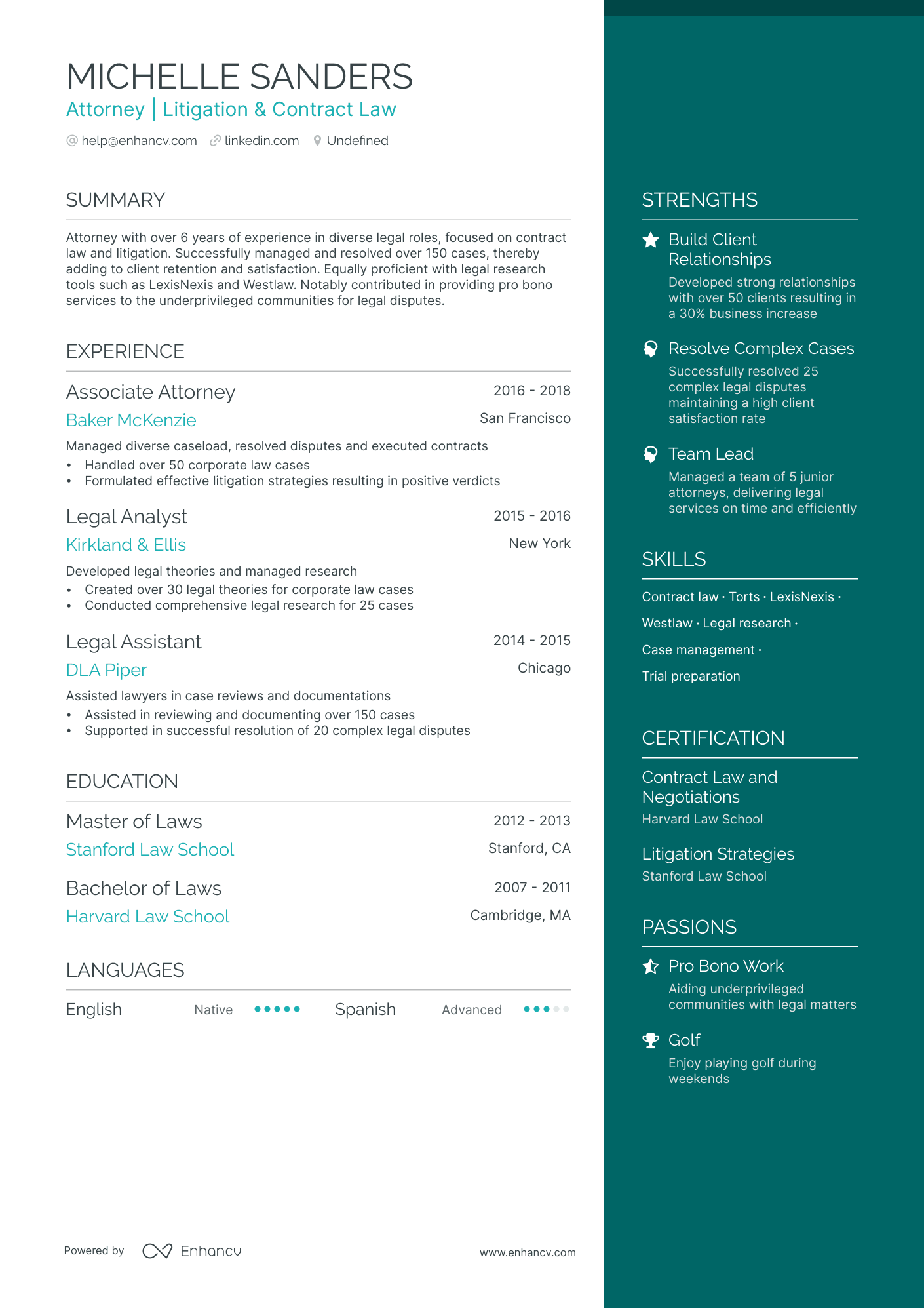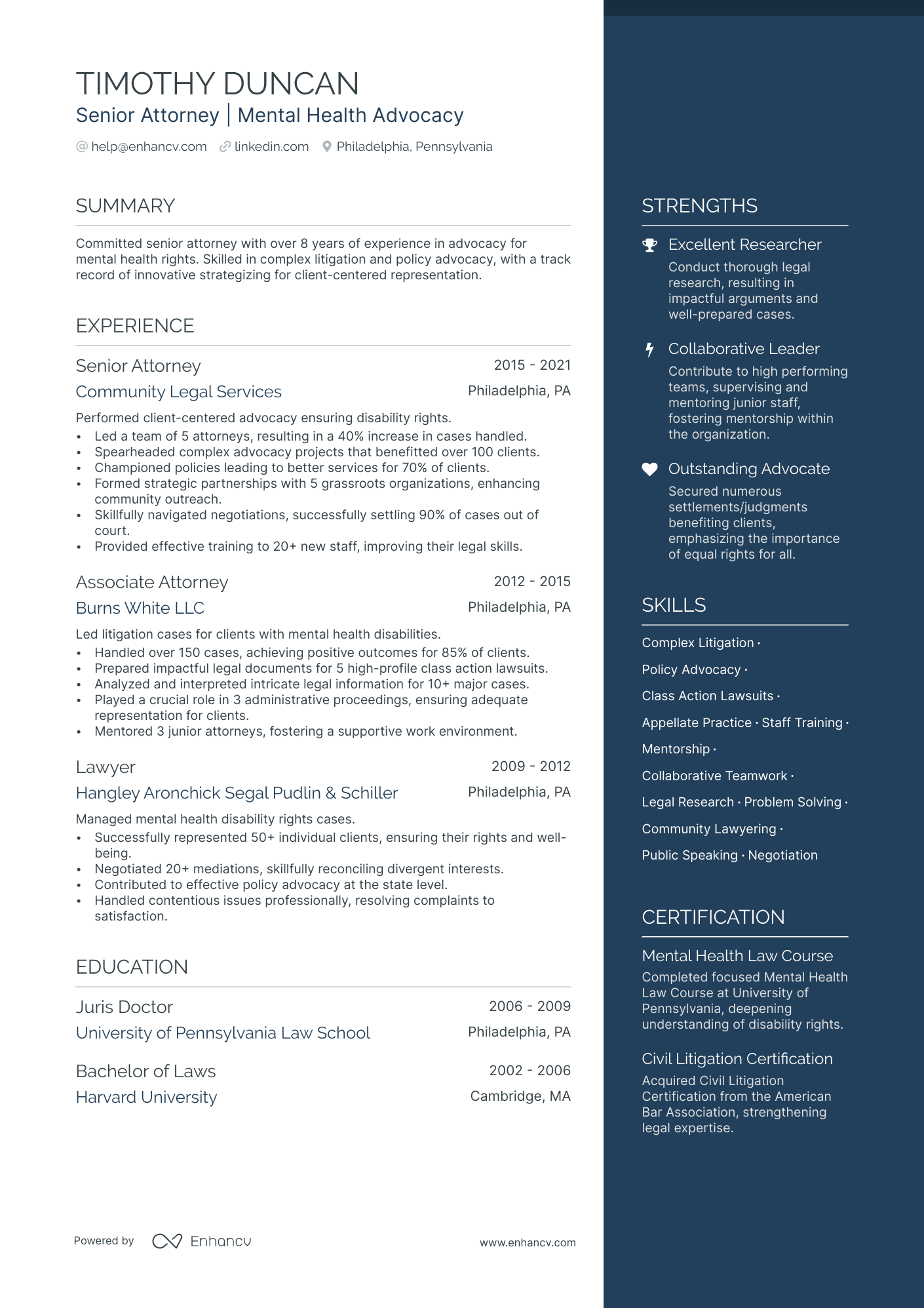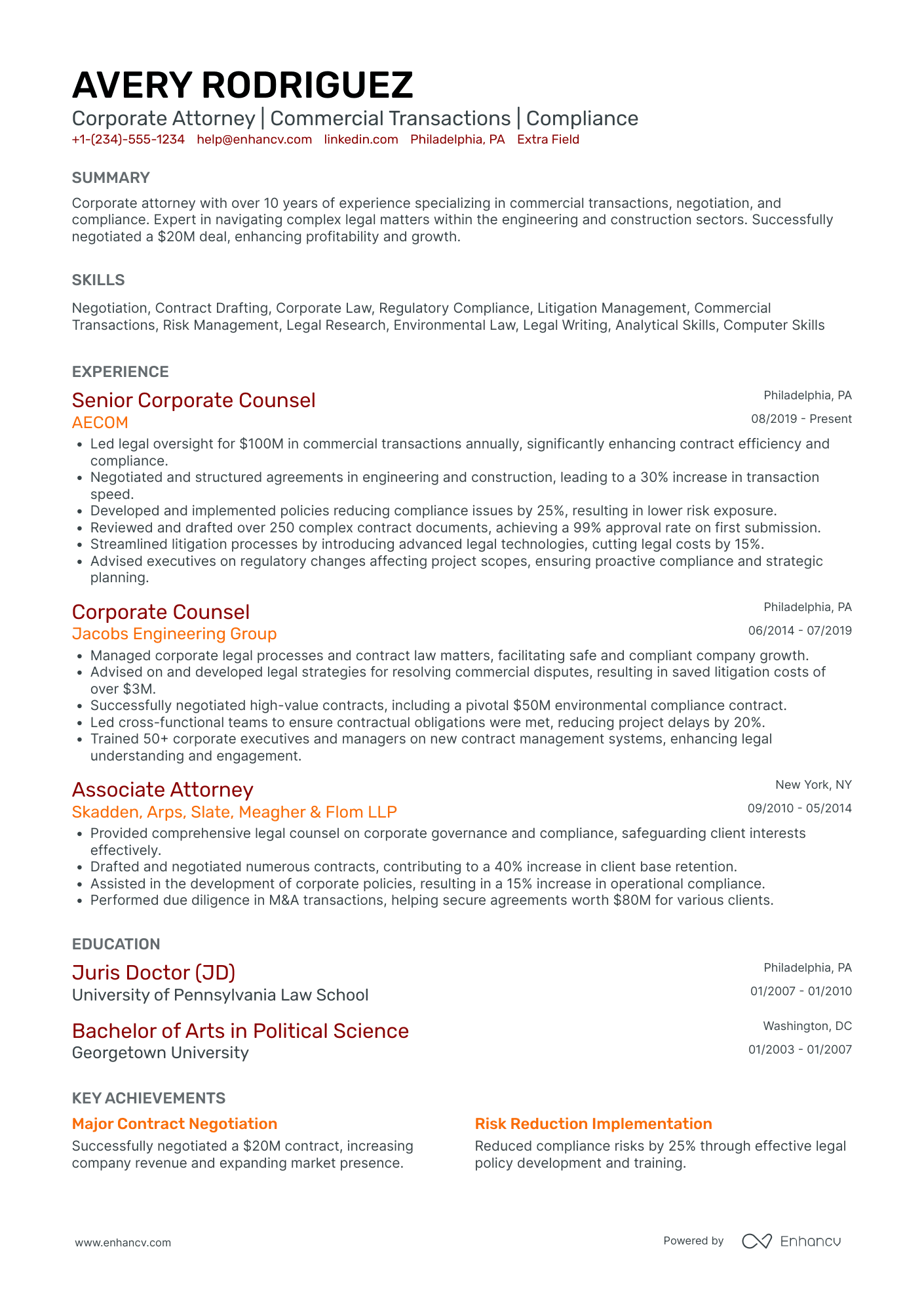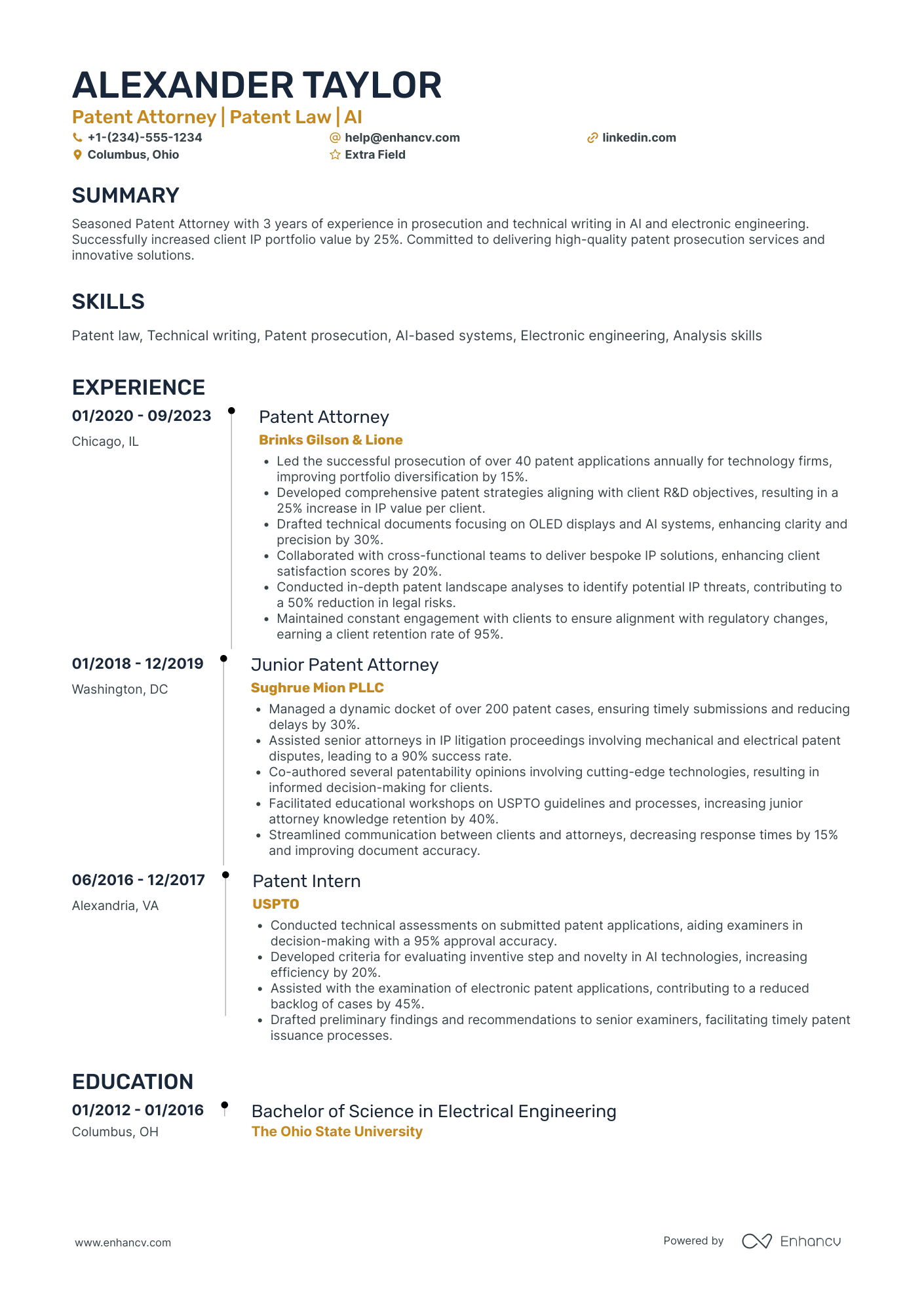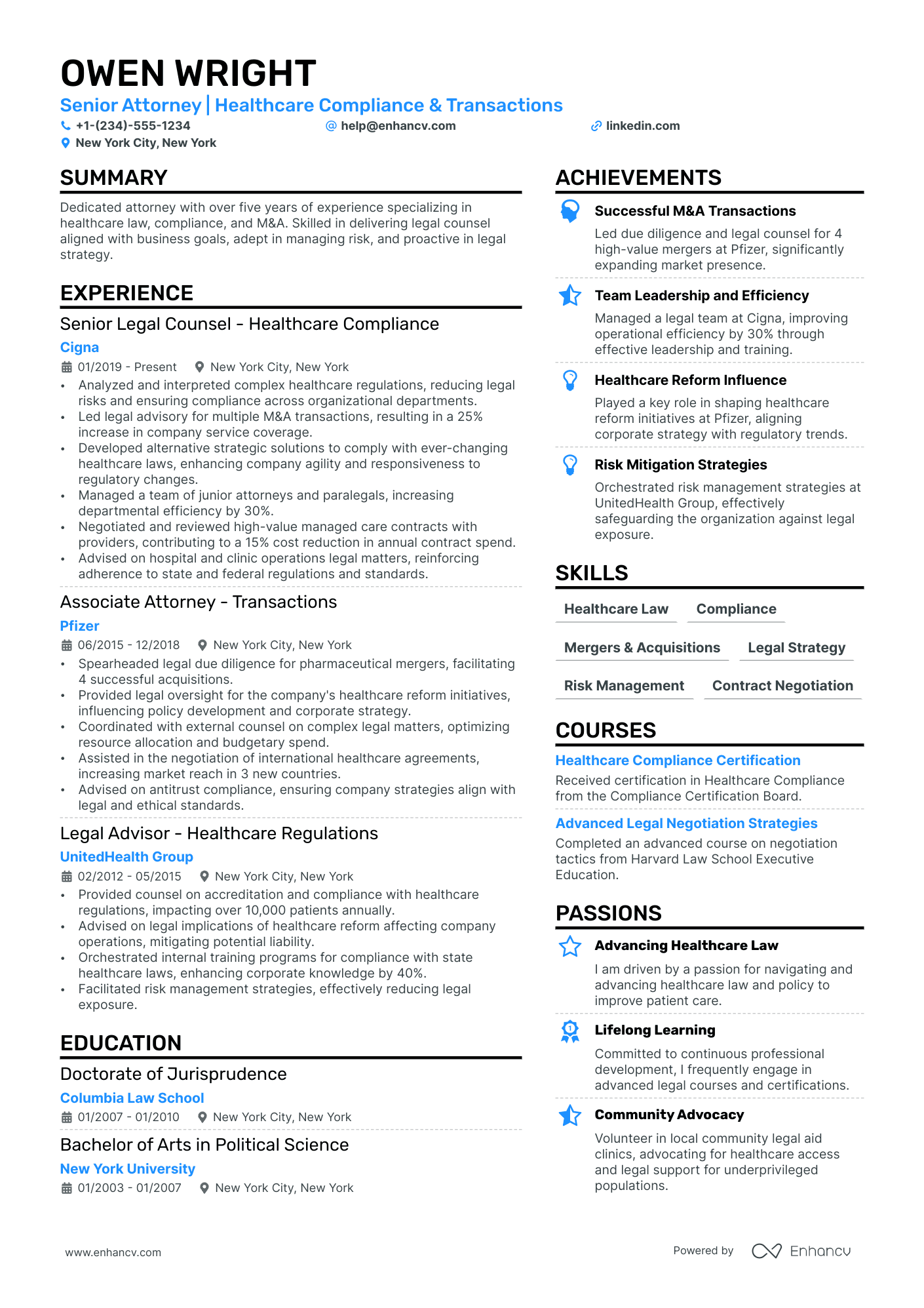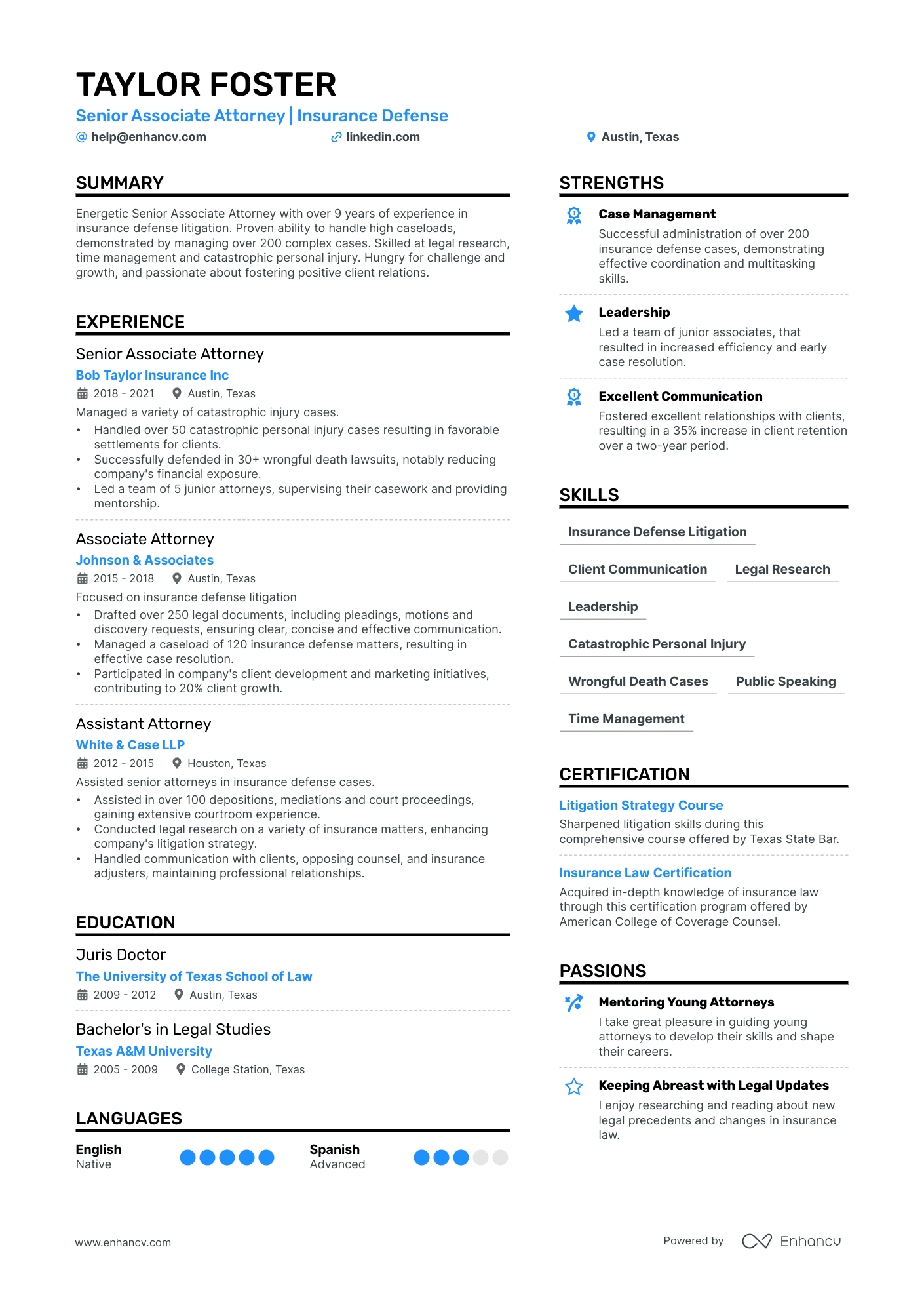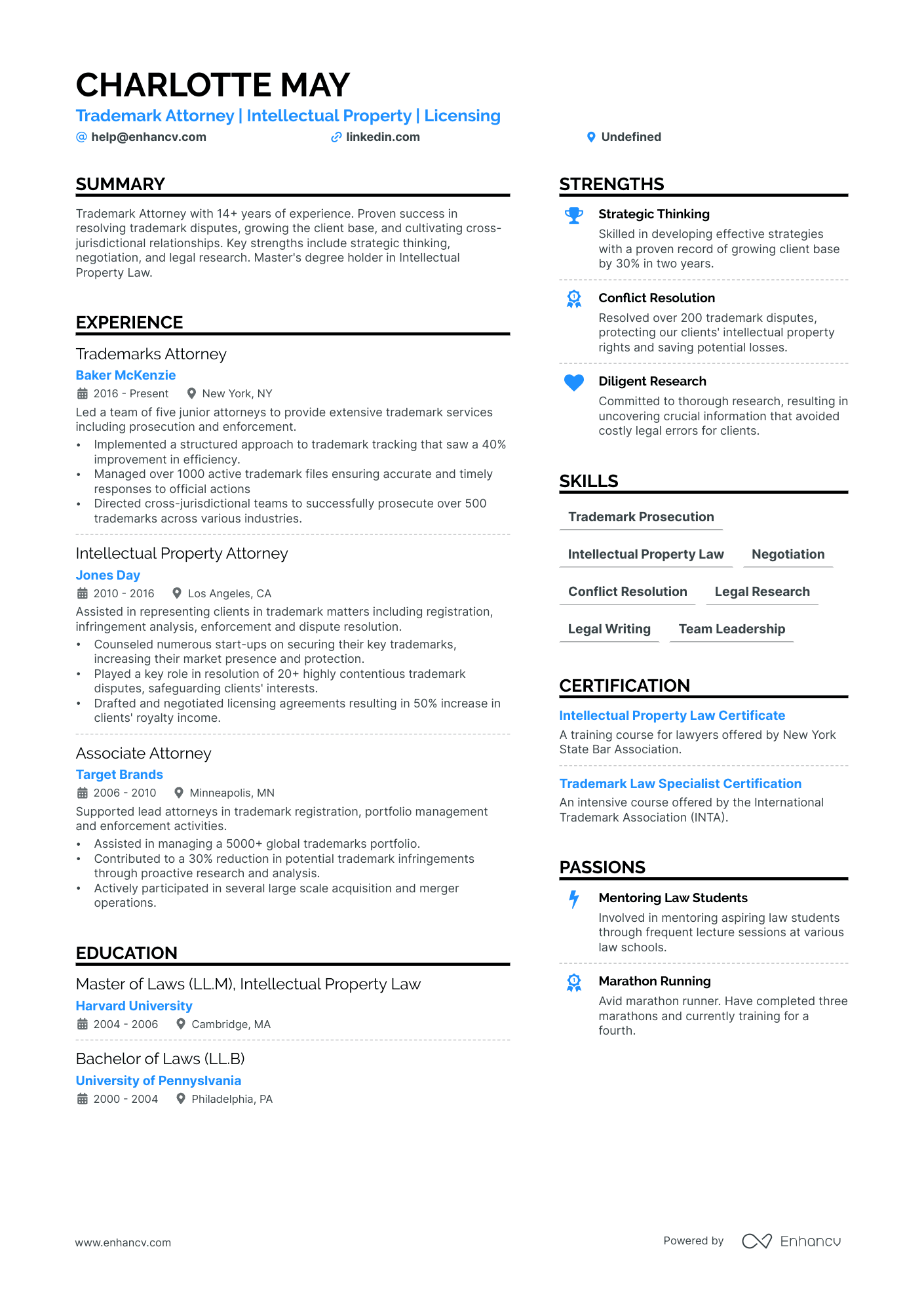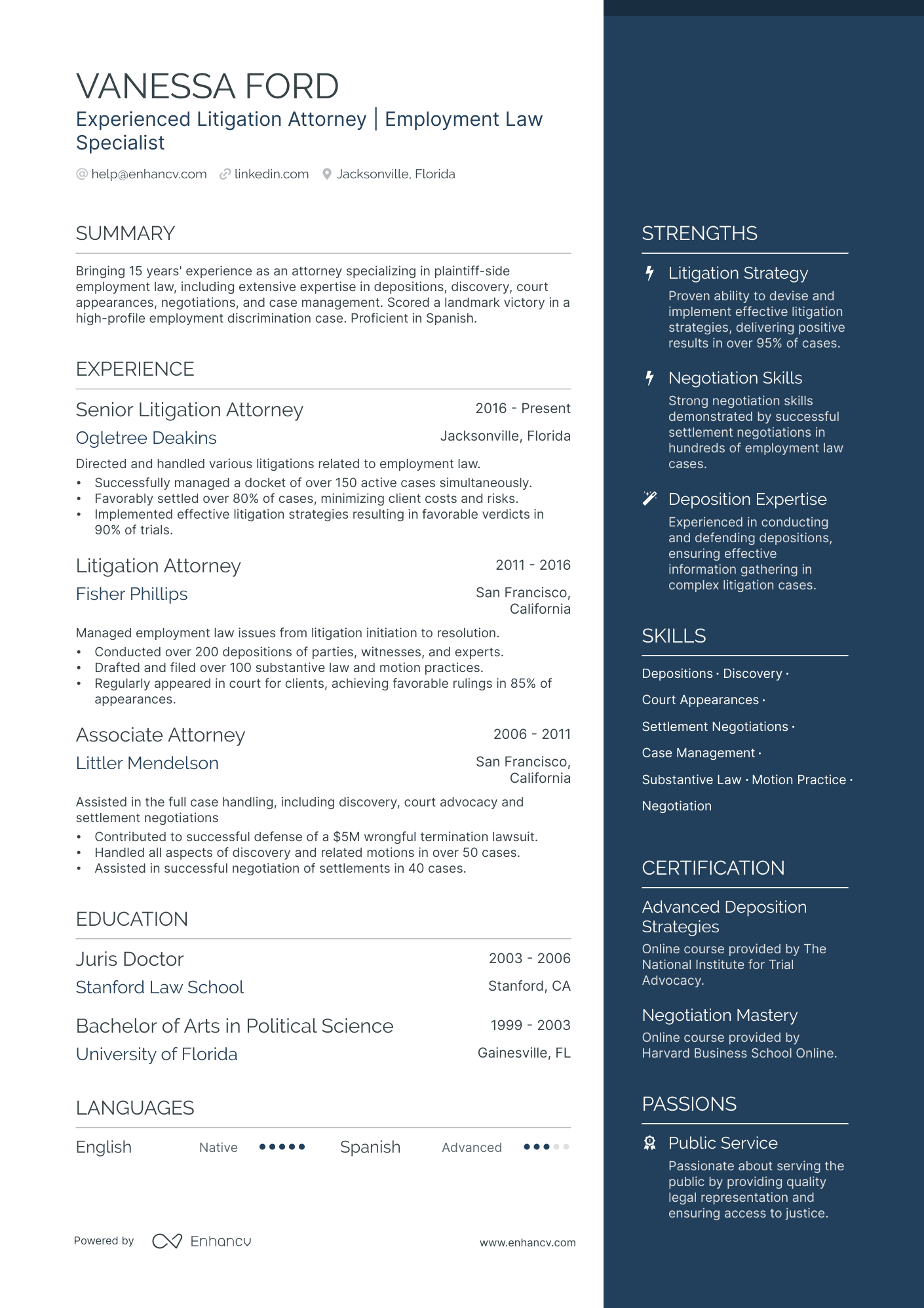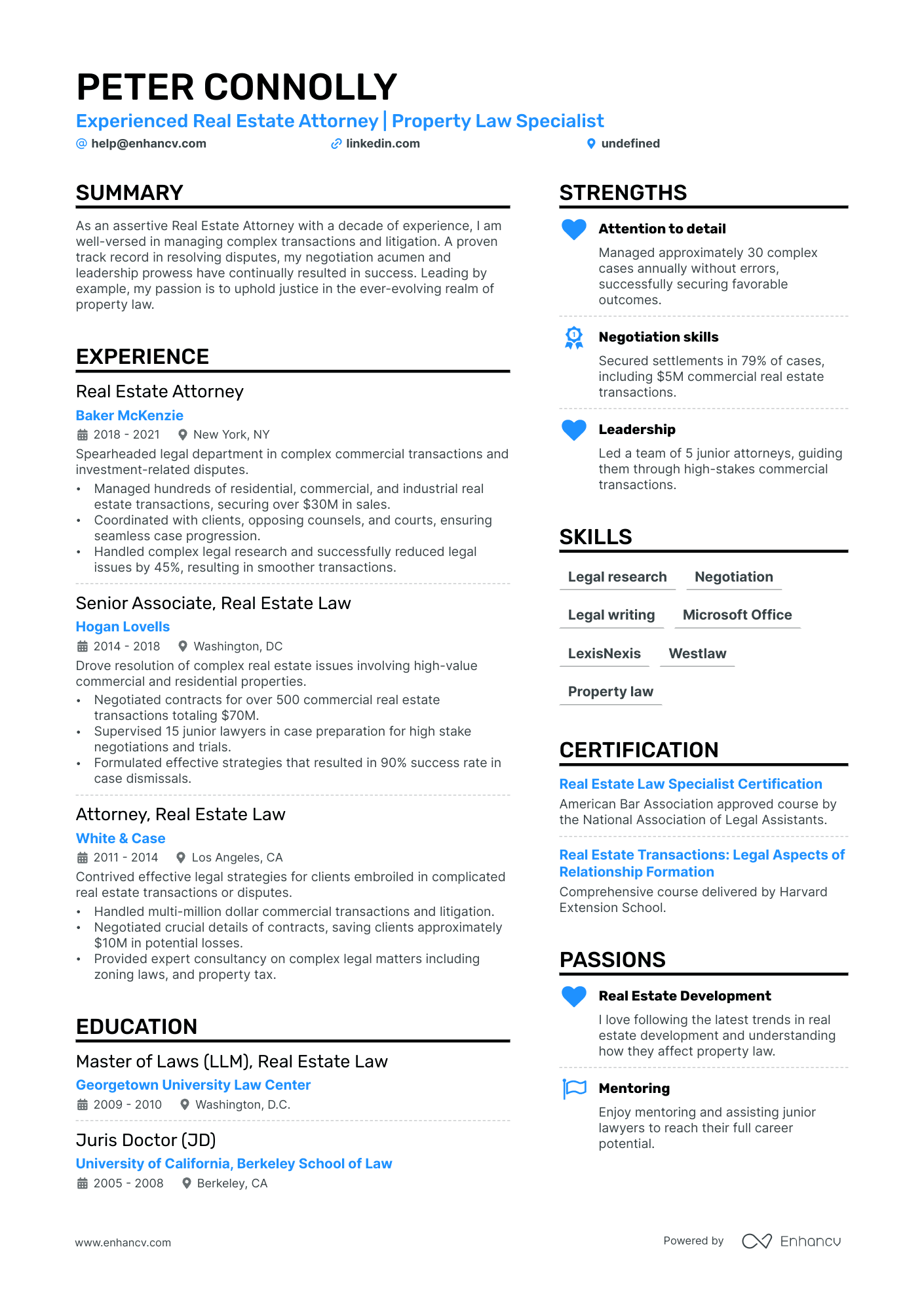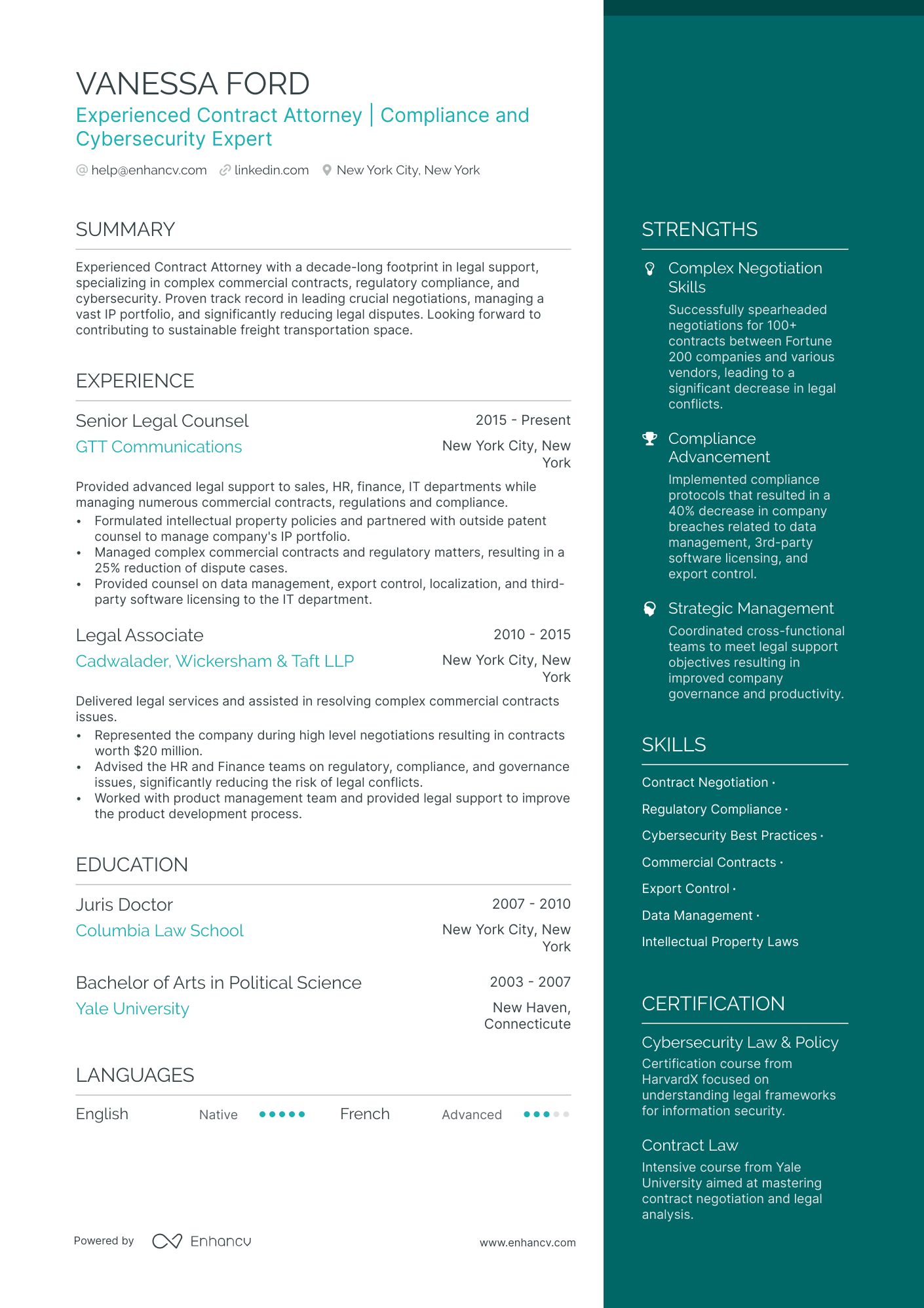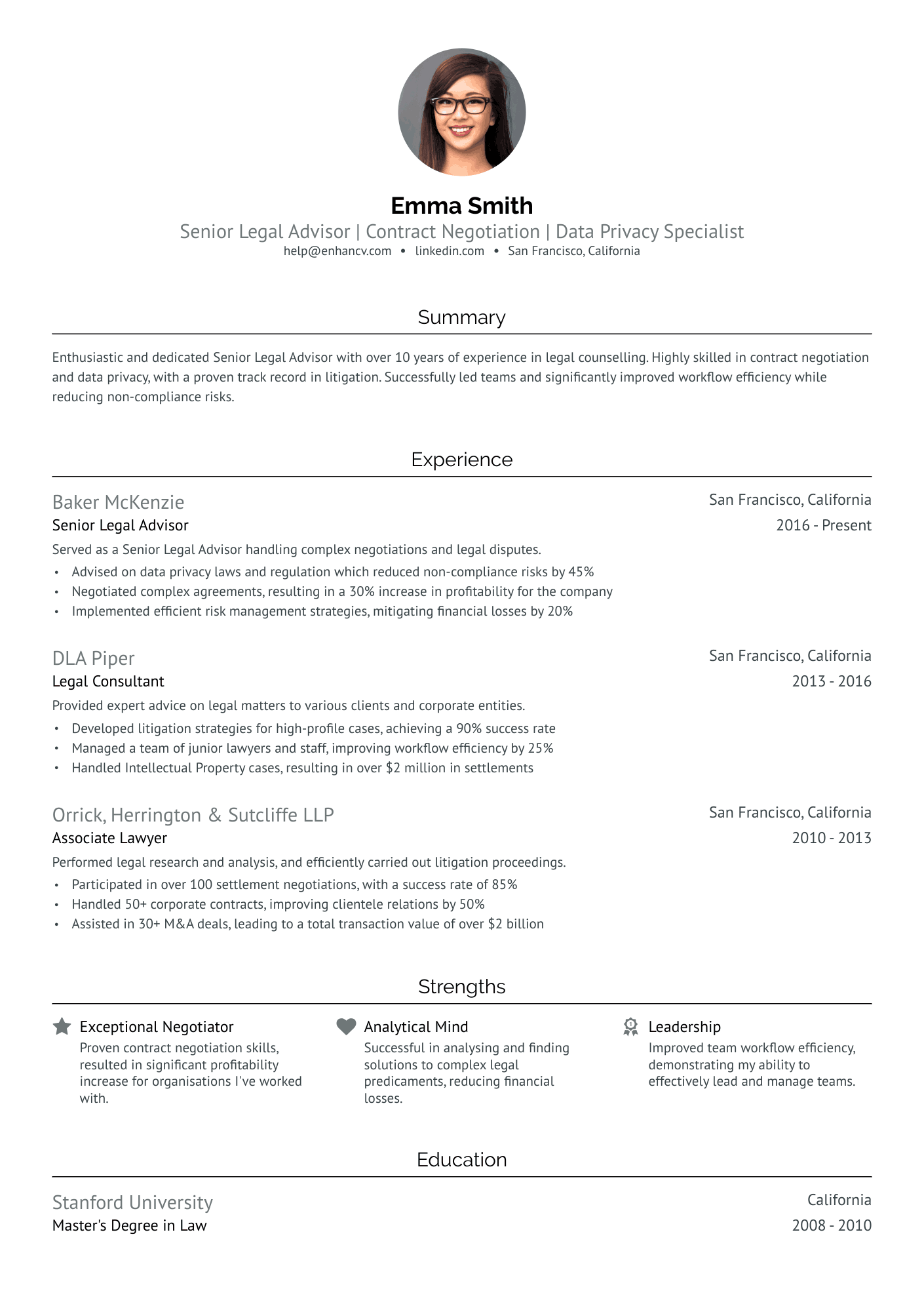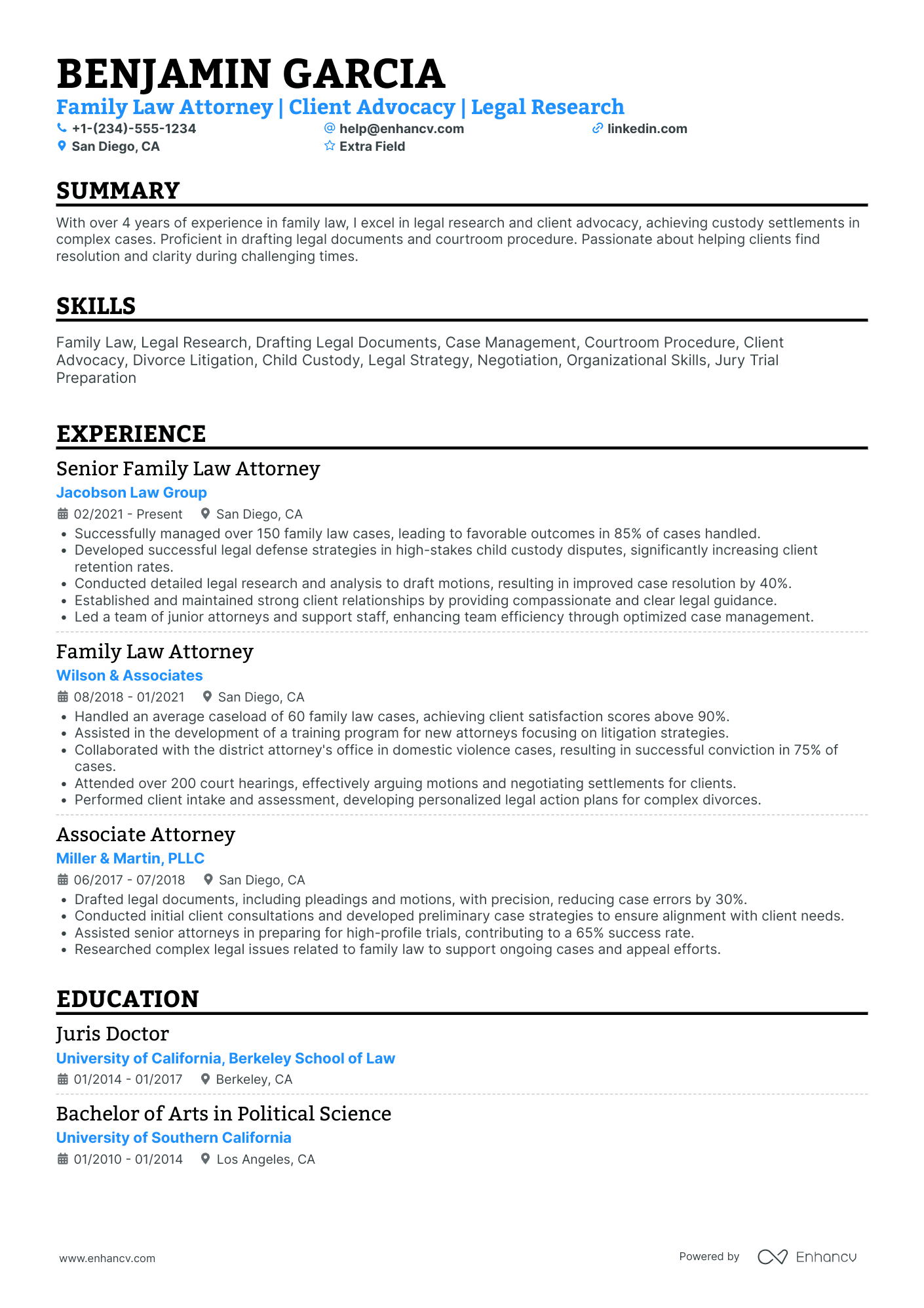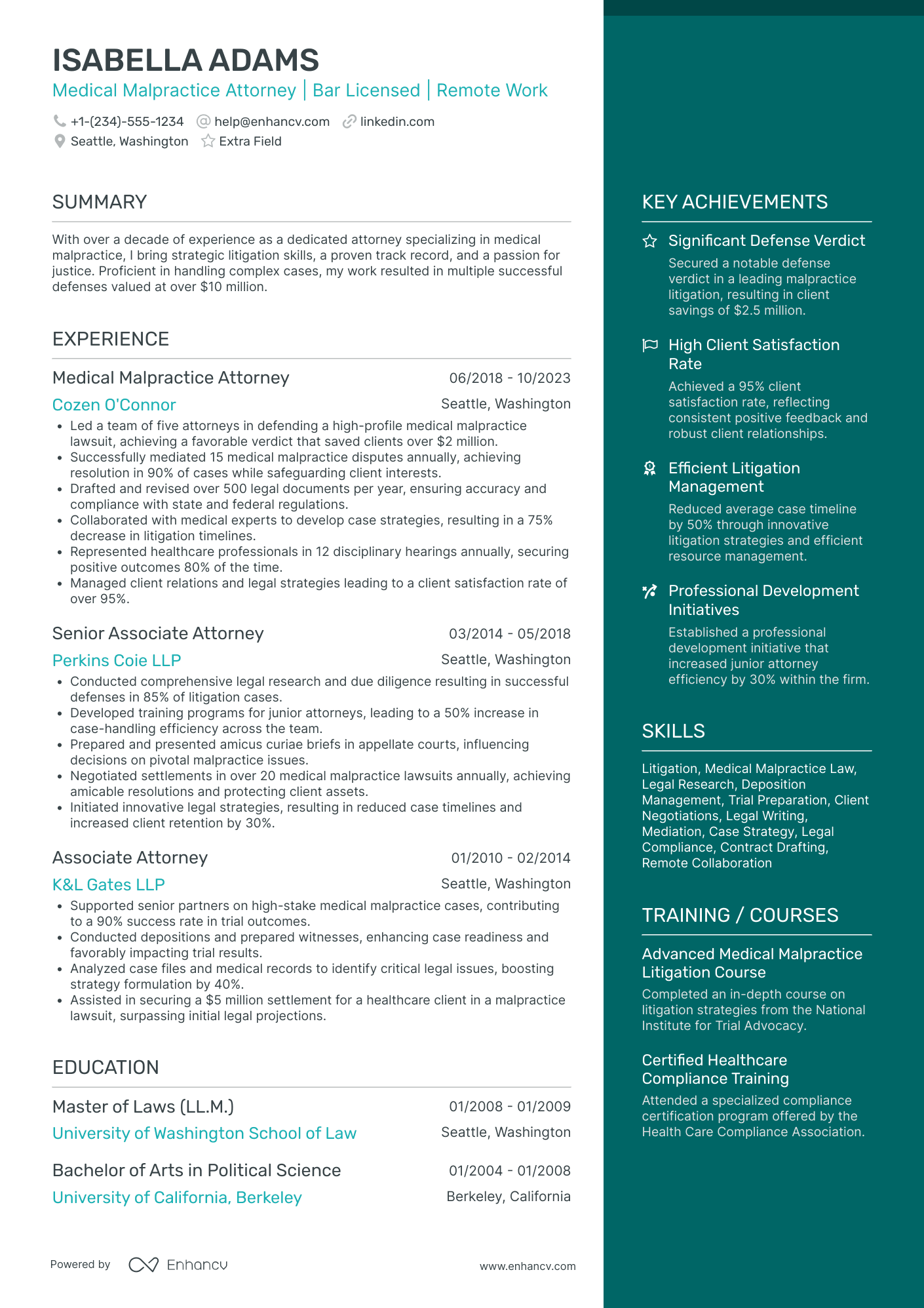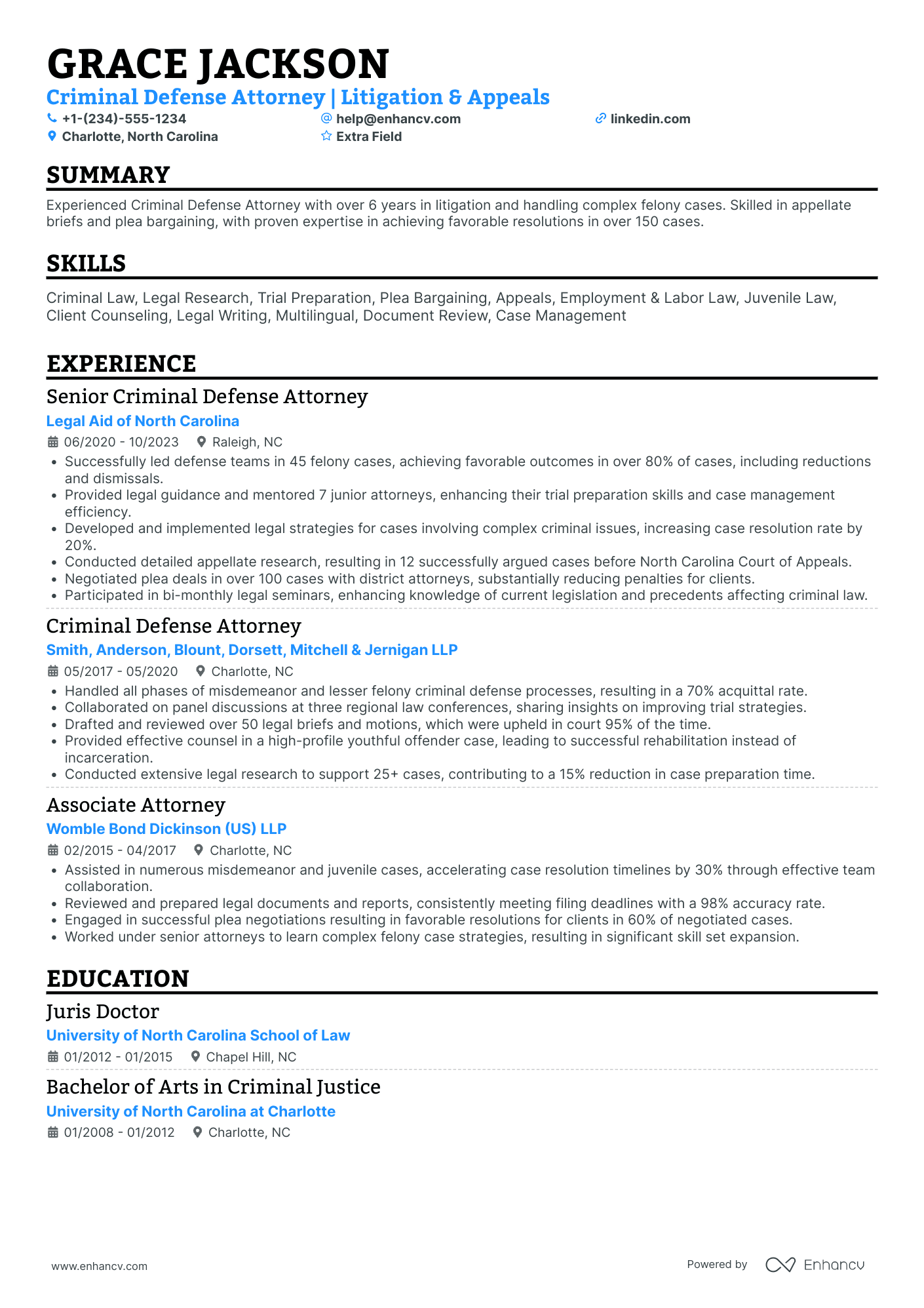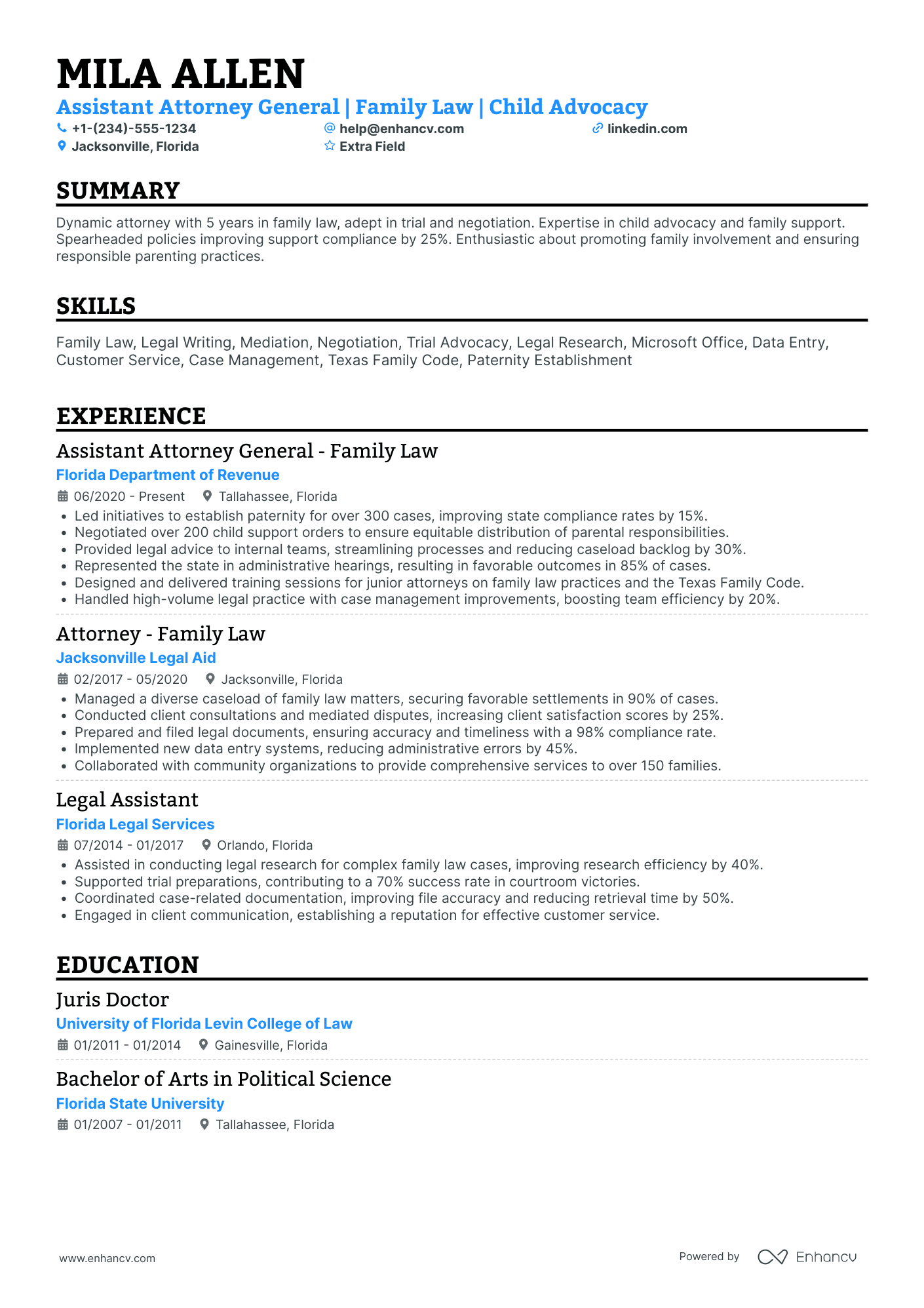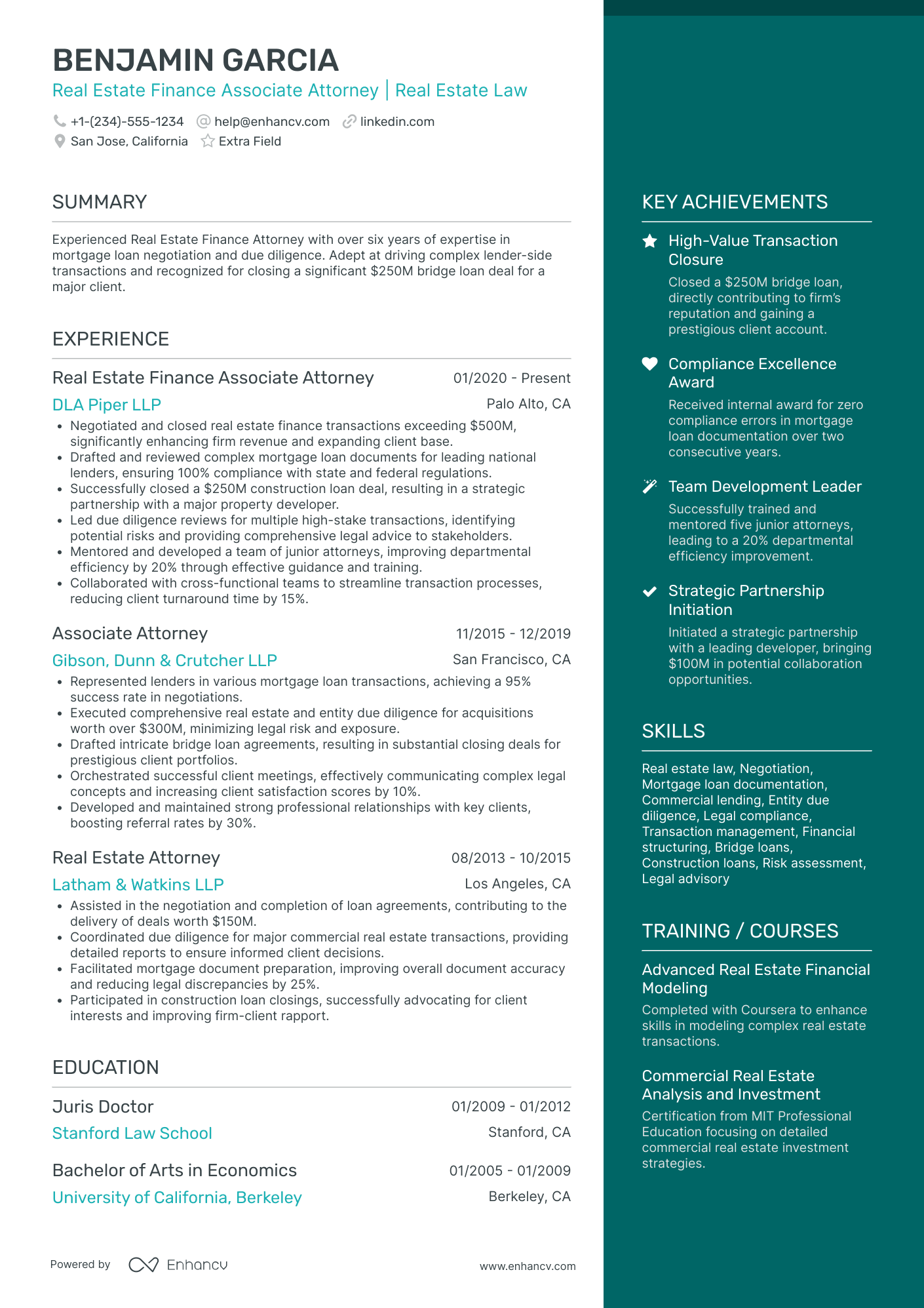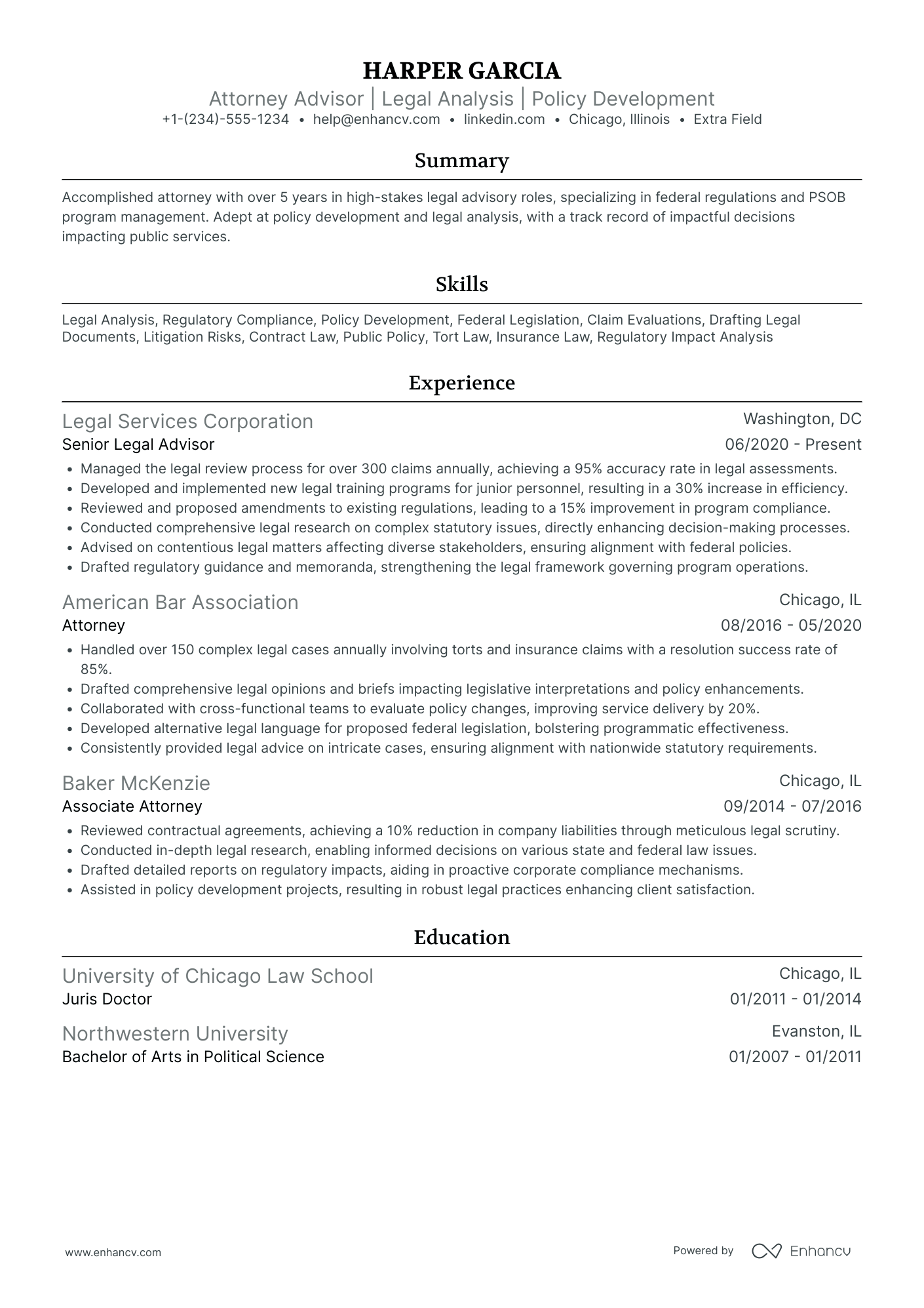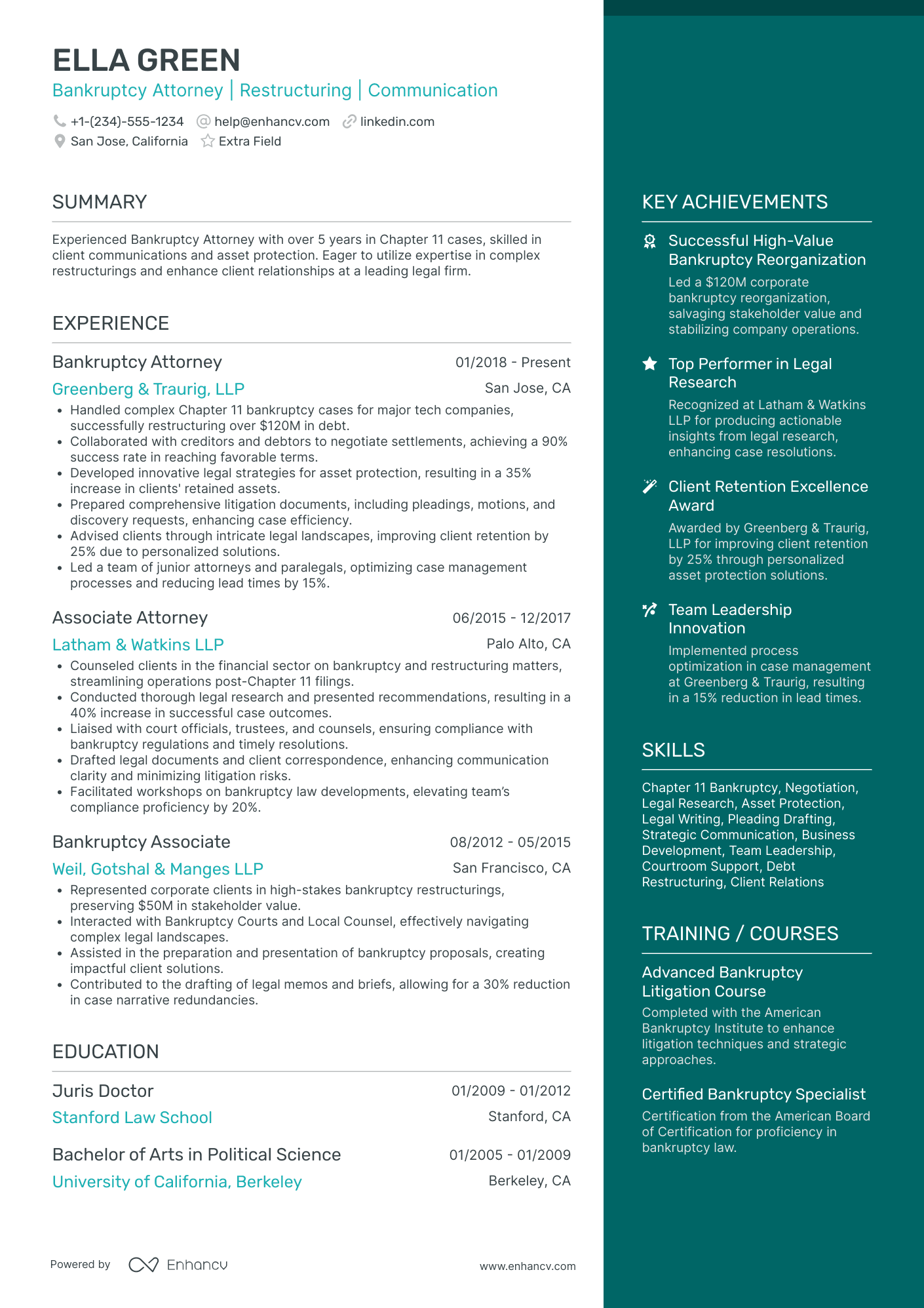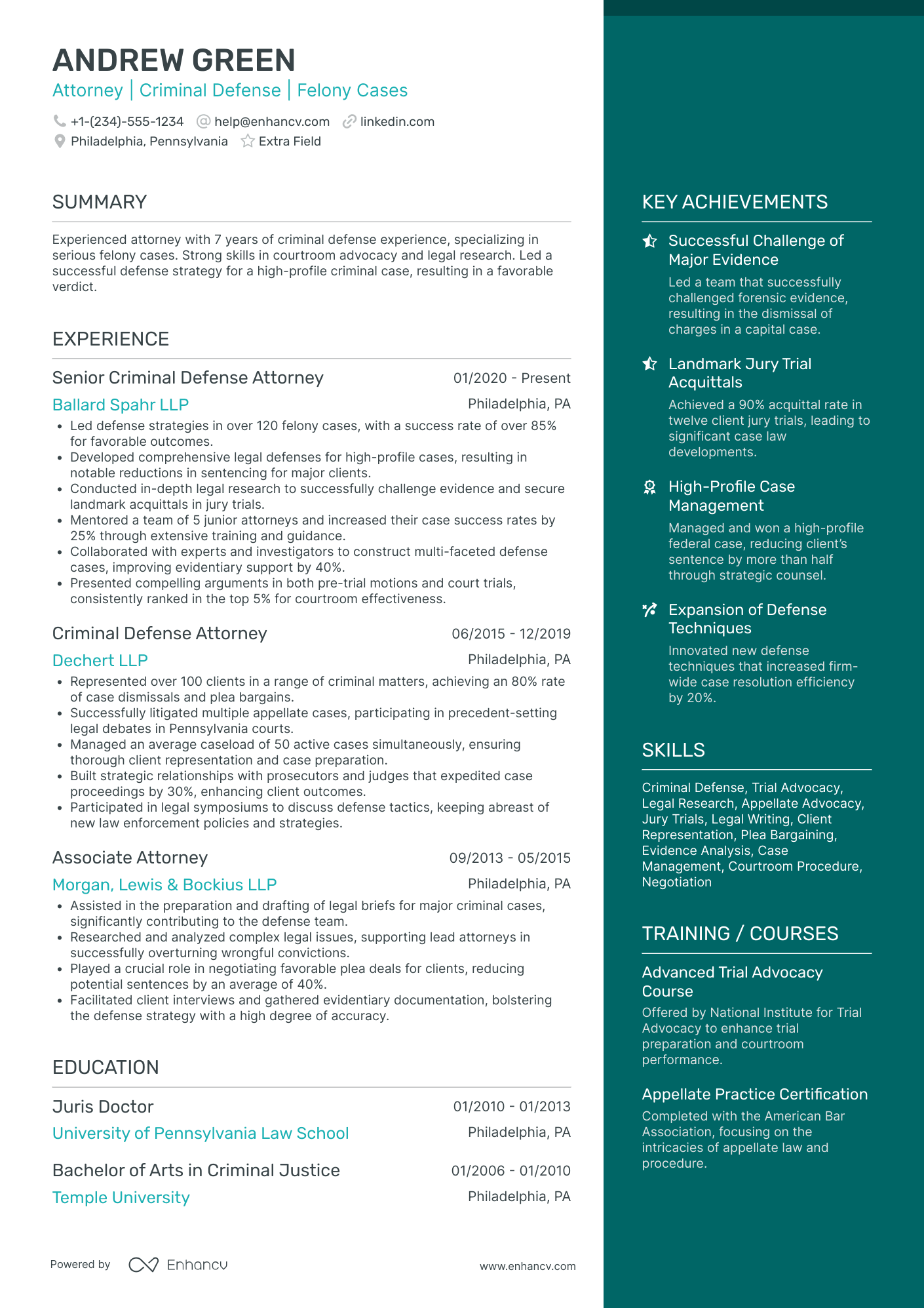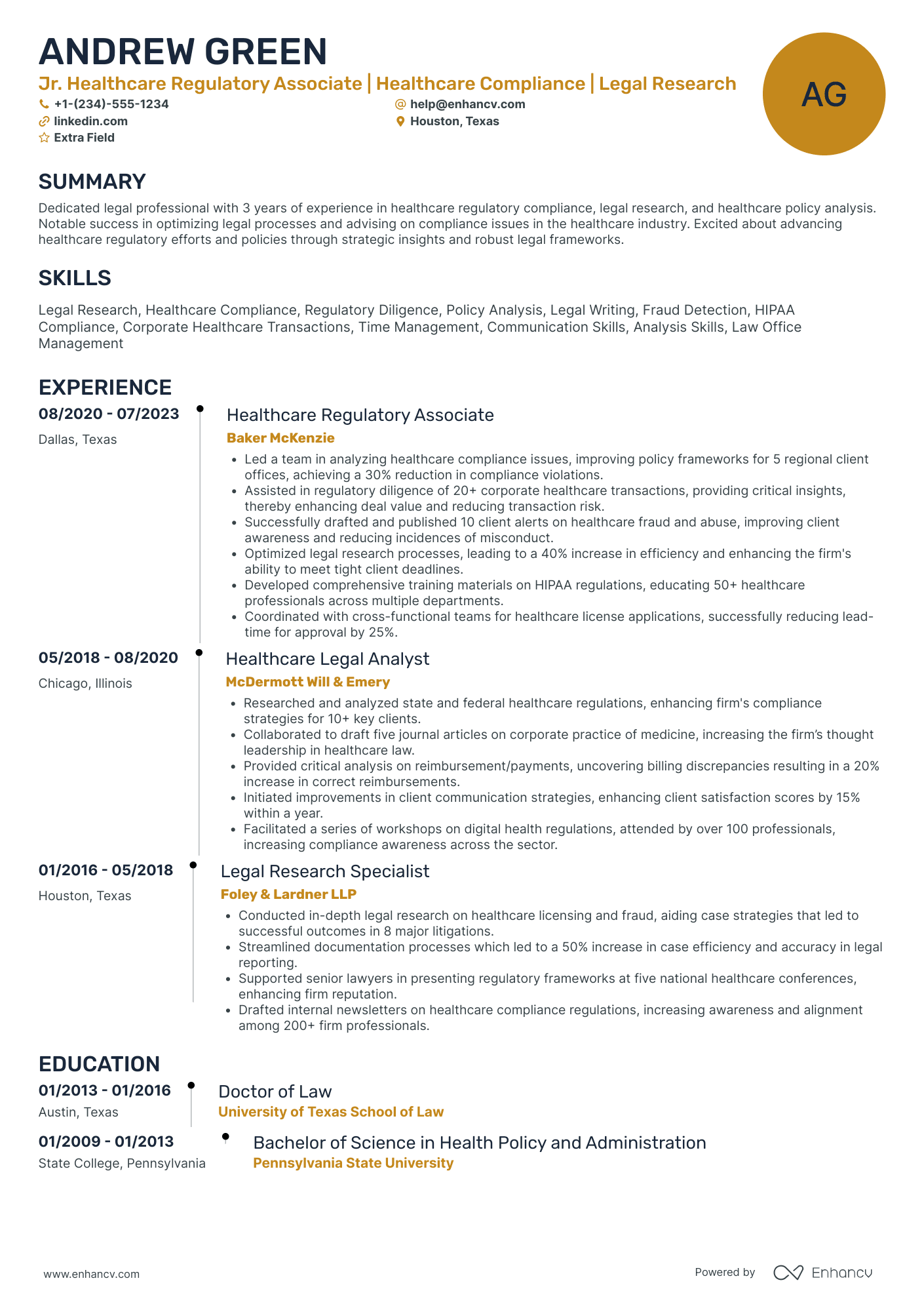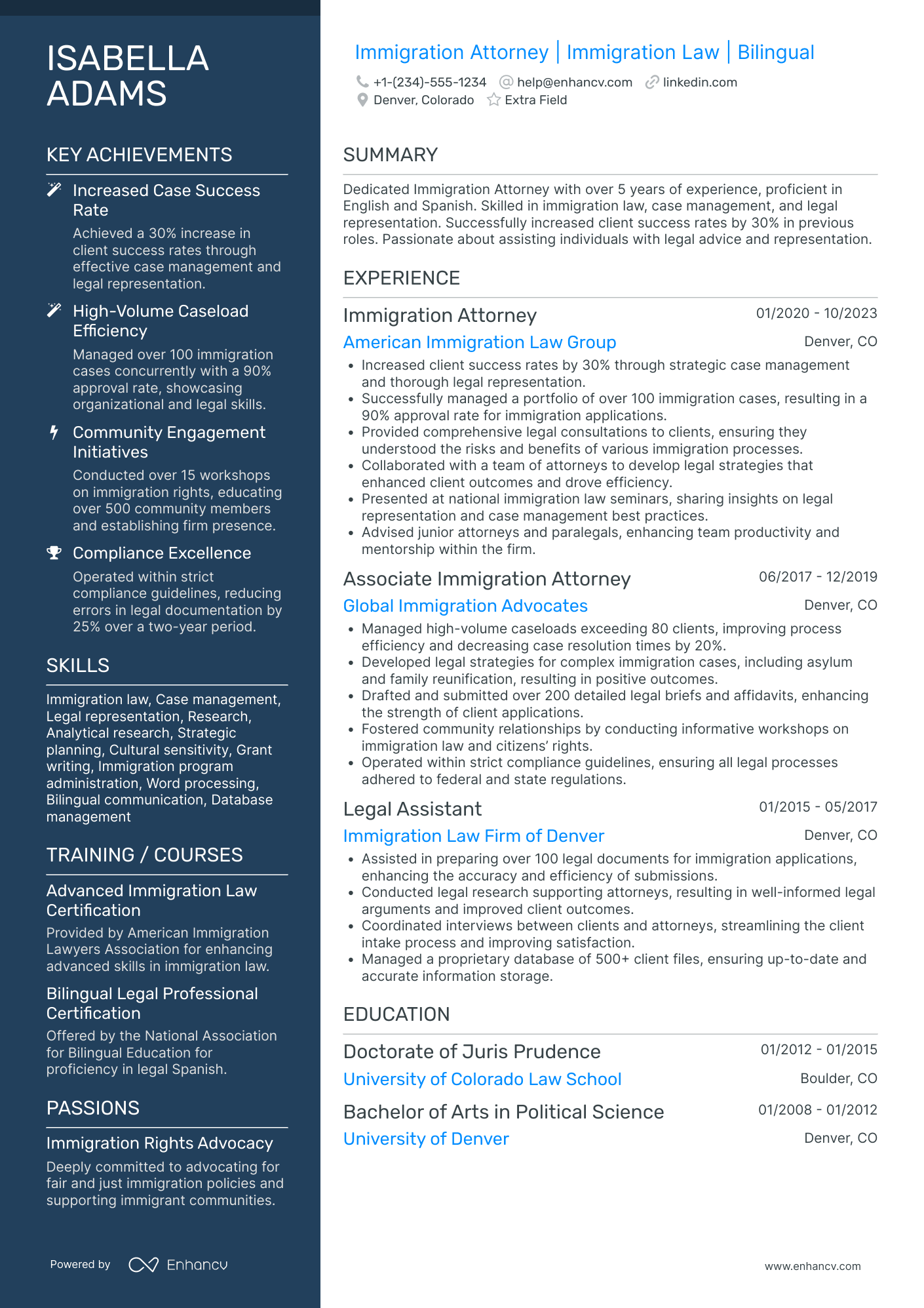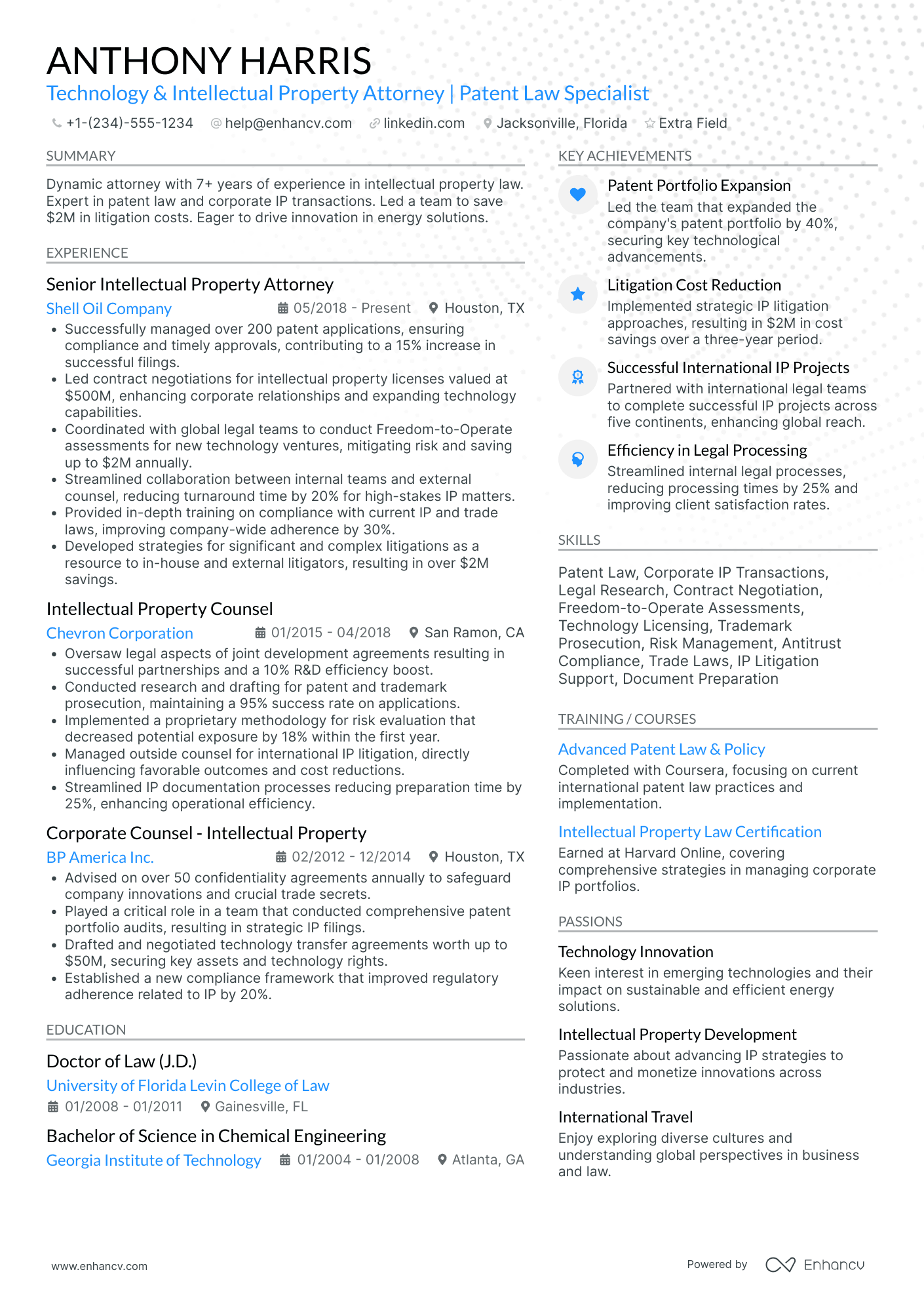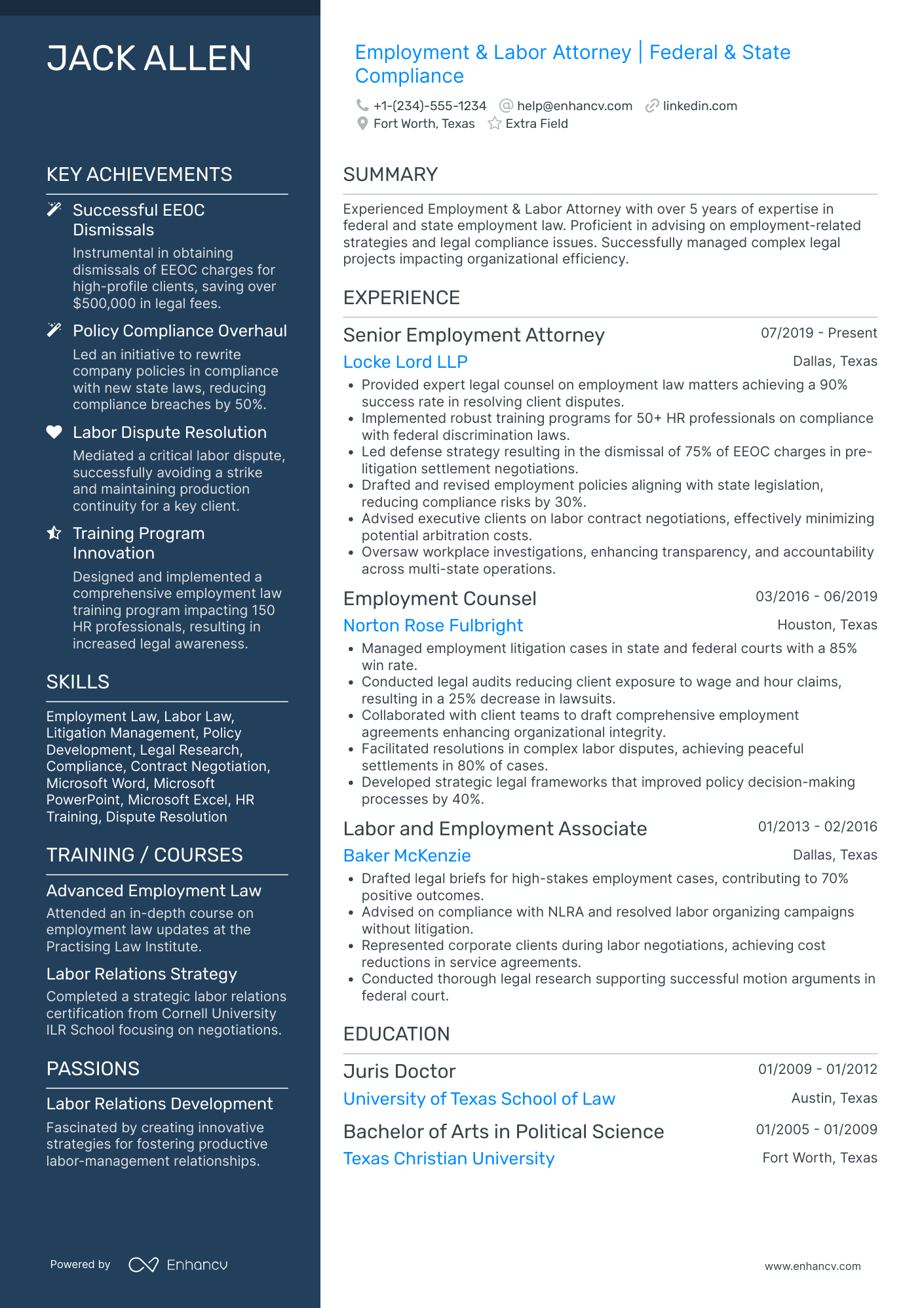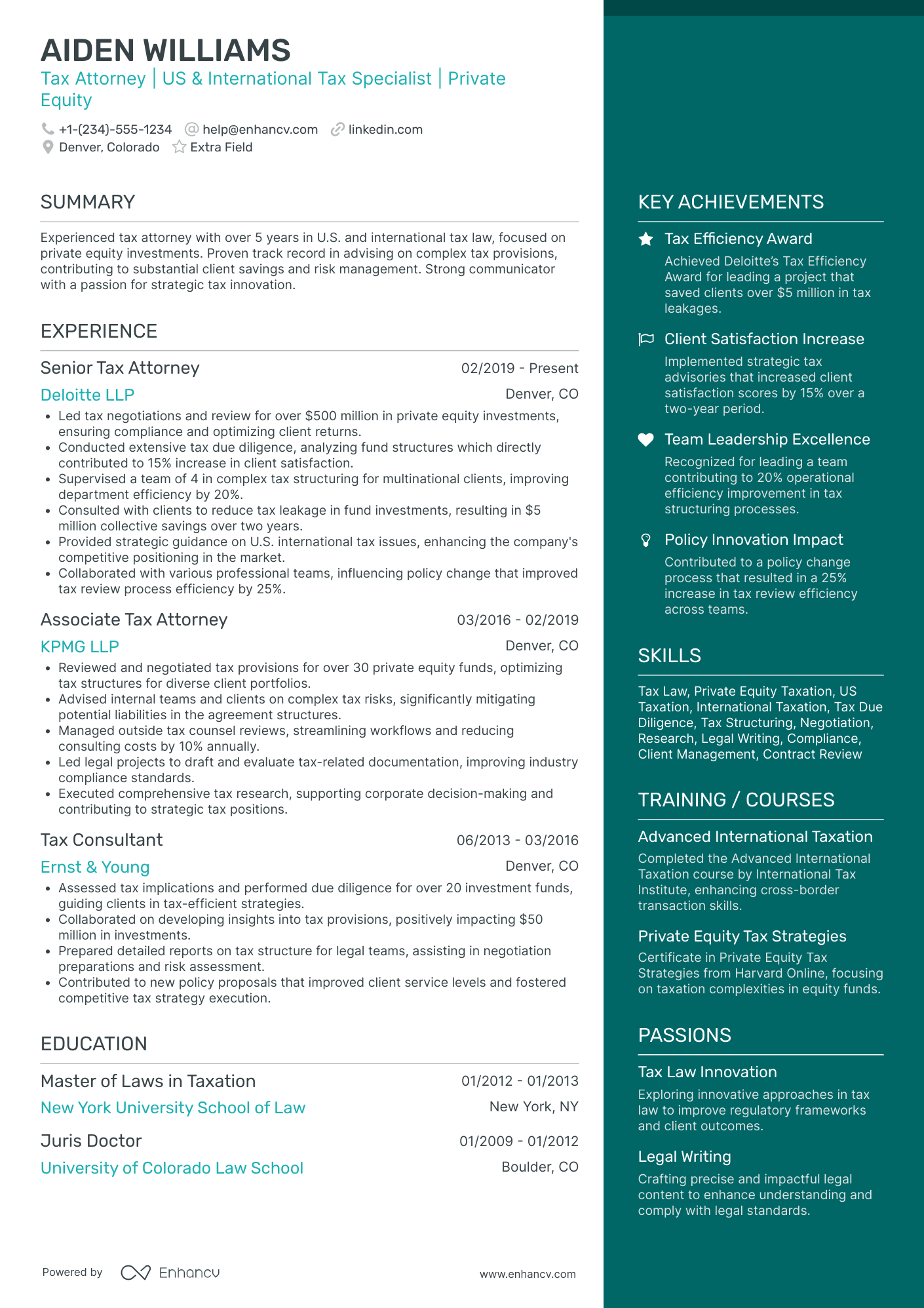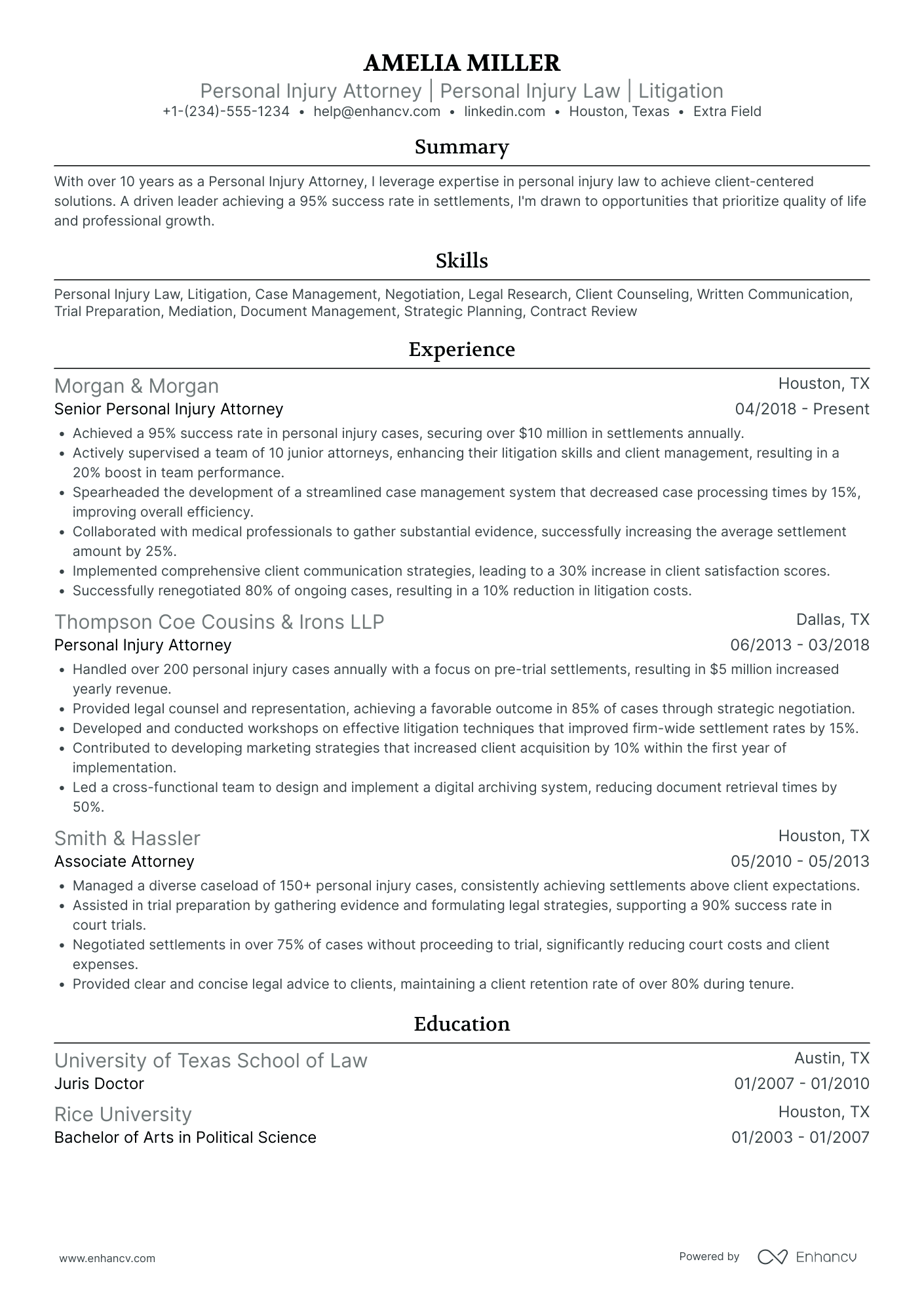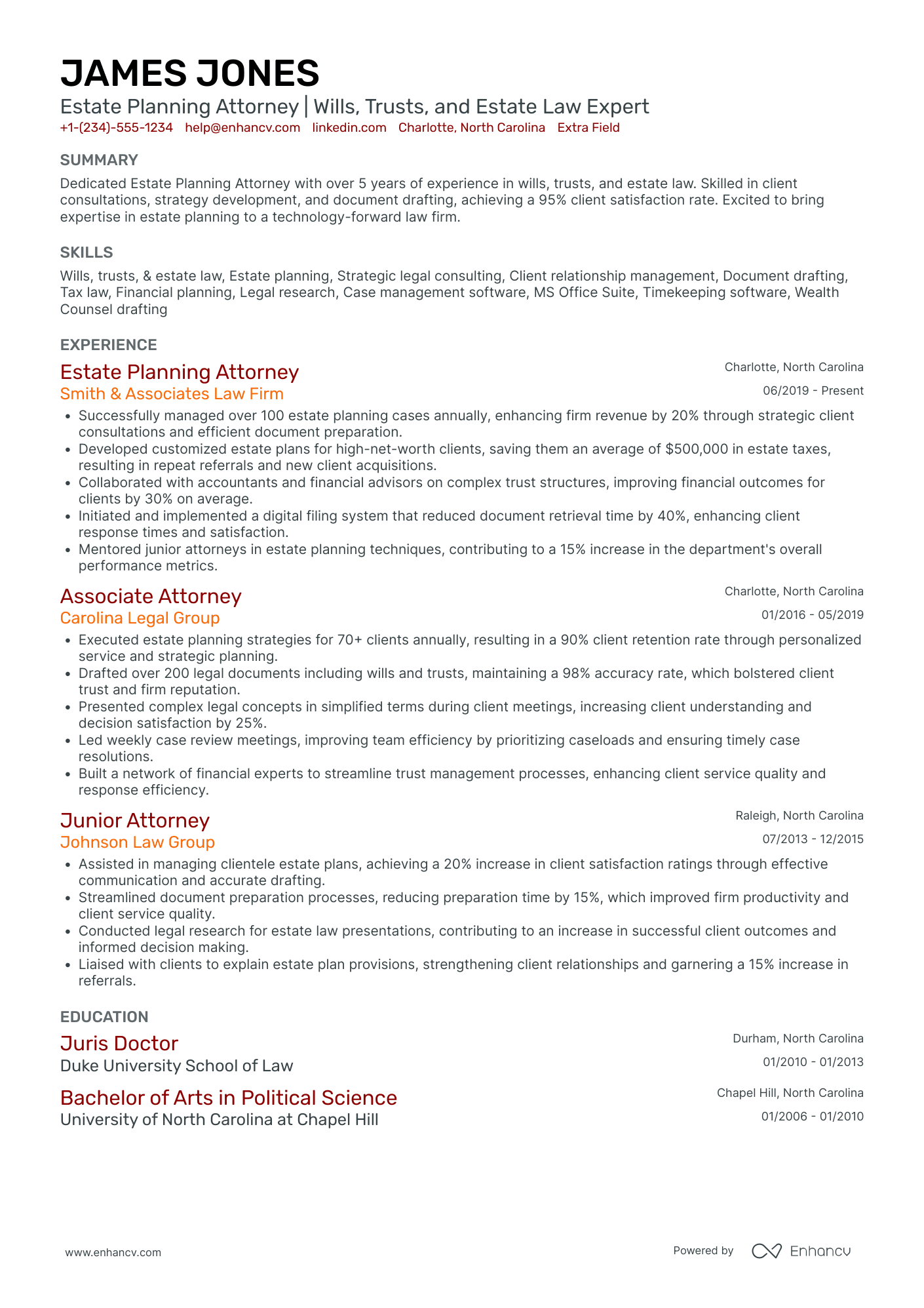Crafting a standout resume is a pivotal step for any attorney looking to navigate the competitive legal job market. Whether you're wrestling with squeezing complex cases into concise statements or standing out in a crowd of similarly qualified candidates, it's hard. Let’s not forget the challenge of articulating your specific skills and experiences in a way that resonates with both legal and non-legal hiring managers.
This comprehensive guide is designed to bridge these gaps. It offers tailored advice and resume writing strategies for attorneys at all career stages, ensuring your resume highlights your legal acumen and sets you apart from the competition.
Today’s guide will cover the following topics:
- The best resume formatting tips, including layout, design, and elegant templates suitable for law practitioners;
- How to feature your professional and educational experience in a way that adds credibility and value to your profile;
- How to maximize the impact of your resume by researching the prospective employer and adding strategic keywords to your career summary;
- Which skills to include in an attorney resume and where to put them exactly if the space is limited.
The bar is high (pun intended), so let’s get started.
Are you interested in a different type of legal resume? Below you might find what you’re looking for.
- Senior attorney Resume
- Entry-level attorney Resume
- Contract attorney Resume
- Lawyer Resume
- Corporate Lawyer Resume
- Employment Lawyer Resume
- Attorney Cover Letter
How to format an attorney resume with precision
attorneys excel at organizing their workload, a skill that should also be reflected in your resume's layout. A tidy resume is the first impression you give to potential employers, so it has to stand out. Opt for a classic template, professional font, and ample white space to ensure your resume is ATS-friendly.
But first, decide on a resume format that speaks to both the traditions and the current practices of the legal profession.
Most seasoned attorneys prefer the hybrid (or combination) format because it allows them to showcase both their chronological work history and their specific skills and accomplishments. Another major advantage is that it’s very versatile—you can choose which aspects of your career to emphasize, whether that's a rich array of legal skills, a history of high-profile cases, or leadership in legal settings.
This doesn’t mean you should avoid the other two top formats. For instance, the reverse-chronological type is more focused on your work experience and is great for those who have an extensive career history in law. At the opposite end of the spectrum are functional resumes, which are skills-oriented, and are best suited for entry-level attorneys.
Attorney resume design and layout
Lawyers know better than anyone that clarity and relevance bring any document to another level. This is what you should be looking to achieve on your resume, too. Consider the following suggestions when building your professional presentation.
Remember, resume layouts can vary by country – for example, a Canadian resume format could look different.
- Create a compelling resume header. Ideally, this section should include your full name, your professional title (e.g. Trademark attorney), and contact information — phone number, email address, and LinkedIn profile. For more impact, you may choose to include your licensure status or a link to your professional website, showcasing your achievements.
- Keep the resume neatly organized. Two major factors will make your resume readable — professional fonts and sufficient white space. For the former, Times New Roman is considered the standard for documents, conveying a more formal tone. Alternatively, you could opt for a sans serif font like Arial, Lato, or Rubik, which aren’t only perfectly legible but also ATS-friendly. Just ensure that the font size is no smaller than 10 pt. Regarding white space, it largely depends on margin sizes. It's best not to reduce margins below 1 inch to prevent your resume from appearing too cluttered and overwhelming.
- Avoid too many graphic elements. It goes with the territory. The legal profession in the United States follows a conservative approach to job applications, which also applies to photos on resumes. The reason is straightforward: photos can lead employers to unintentionally bias or discriminate, and ATS scanners might not process these images correctly. The same goes for resume icons, which don’t align with the profession's strict professional standards.
- Proofread your resume. While it may seem like a basic step, it's always beneficial to run your final document through our AI-powered resume checker. This tool doesn't just offer content advice; it also identifies any typos, ensuring your resume is polished to perfection.
- Save your file as a PDF. Unless explicitly mentioned otherwise, it’s best to save your resume as a PDF to avoid unexpected formatting changes which is often the case with Word resumes. The file naming convention goes as follows: your name, your job title, and the word resume (JohnDoeEmploymentattorneyresume.pdf).
Is your resume good enough?
Drop your resume here or choose a file. PDF & DOCX only. Max 2MB file size.
Now that we’ve clarified the right format, let’s consider the must-have sections for a flawless attorney resume.
The top sections on an attorney's resume
- Legal experience: Showcases your practical law application.
- Education & bar admission: Essential for legal qualifications.
- Skills & competencies: Highlights legal expertise and soft skills.
- Legal publications: Demonstrates thought leadership in law.
- Awards & recognitions: Affirms excellence in the legal field.
These sections are needed for a reason. Hiring managers say that they derive valuable insights from resumes that are structured according to the standards in a given field.
What recruiters want to see on attorney resumes
- Relevant legal experience, as it shows practical skills and knowledge.
- Specialization areas, indicating expertise in specific legal domains.
- Education and bar admissions—these verify legal qualifications and licensure.
- Professional achievements, highlighting successes and recognitions.
- Legal writing and research skills, essential for effective case handling.
Now, let’s proceed to crafting the required sections one by one.
How to write your attorney resume experience
attorneys face three main challenges when building their resume experience. Firstly, you need to choose your most relevant experiences. What you select to include in your resume has to align closely with the job you’re applying for.
Secondly, you need to figure out which skills and experience can differentiate you from other candidates. The legal field is competitive, and attorneys often have similar backgrounds and experiences, so you need to make an impact with а carefully targeted experience section.
Finally, you should quantify your achievements by supporting your contributions with concrete data.
Let’s consider two examples, a good and a bad one.
- •Led a team of junior attorneys and paralegals in high-stakes litigation cases.
- •Provided strategic legal counseling to clients.
- •Negotiated and drafted complex contracts and agreements.
- •Engaged in pro bono work.
This experience entry is far from clear and precise. It provides no evidence of the candidate’s contributions and does the opposite of what is expected from a lawyer’s resume.
Below is the improved version.
- •Led a team of junior attorneys and paralegals on over 30 high-stakes litigation cases, achieving favorable outcomes in 90% of them.
- •Advised over 100 clients on legal compliance, significantly reducing their legal risks and potential for litigation.
- •Successfully negotiated and drafted over 200 complex contracts and agreements, leading to a 95% client satisfaction rate.
- •Contributed over 500 hours of pro bono legal services to underserved communities in the Chicago area, focusing on housing and employment law.
This is effective for a few reasons:
- Quantified achievements: Specific numbers on a resume (e.g., cases handled, contracts negotiated, pro bono hours) provide clear evidence of the attorney's impact and effectiveness.
- Outcome-oriented: Highlighting favorable outcomes and high satisfaction rates demonstrates the attorney's ability to deliver results, appealing to potential employers looking for proven performers.
- Scope of work: Quantifying the scope of responsibilities and achievements gives a sense of scale and the level of trust previous employers placed in the attorney. This is amplified by the use of action verbs like led, advised, negotiated, and contributed.
- Community contribution: Including quantified pro bono work not only highlights the attorney's legal expertise but also their commitment to social responsibility. This enhances the candidate’s soft skills range and profile as a well-rounded professional.
Assuming the candidate has carefully reviewed the job description and strategically incorporated relevant keywords into their resume's experience section, their chances of securing the job are significantly higher. The same strategy can be applied by novice attorneys. Read on to learn more.
How to quantify impact on your resume
The following suggestions can help you add credibility to your attorney resume.
- Include the amount of damages won in litigation cases, showcasing your ability to secure substantial financial victories for clients or employers.
- List the percentage reduction achieved in settlement negotiations, highlighting your skill in reducing liabilities and saving resources in legal disputes.
- Detail the number of successful motions or briefs filed, underscoring your proficiency in legal writing and argumentation, reflecting your tactical legal acumen.
- Mention the total value of contracts reviewed or drafted, illustrating your experience with significant commercial agreements and your understanding of complex legal and business considerations.
- Quantify the number of regulatory compliance projects led, showing your expertise in navigating and adhering to complex regulatory environments.
- Specify the percentage increase in firm revenue or client base due to your direct efforts to prove your contribution to business growth and client satisfaction.
- Report the number of pro bono hours contributed, reflecting your commitment to social responsibility and ethical practice, showcasing your values and character to potential employers.
- Count the number of legal seminars or training sessions conducted, demonstrating your role in legal education and knowledge sharing.
PRO TIP
Use a cover letter to expand on your accomplishments with a storytelling approach. This is a strategic way to complement your resume. By detailing the context, your actions, and the quantifiable outcomes, you provide concrete evidence of your capabilities.
How do I write an entry-level attorney resume
For attorneys with no experience, the best advice is to focus on showcasing your potential, versatility, and readiness to contribute to a legal setting from day one. Here are key sections to emphasize:
- Education: Highlight your law degree, mentioning your law school's name, your GPA (if impressive), and any honors or distinctions (e.g., cum laude). Include relevant coursework or academic projects that demonstrate your expertise.
- Legal internships: Detail your experiences in internships or legal clinics, focusing on your responsibilities, the skills you developed, and any tangible outcomes or contributions you made.
- Moot court or mock trial participation: If you participated in such competitions, describe your role, the skills you honed (e.g., public speaking, legal analysis), and any achievements or recognitions.
- Volunteer work and pro bono projects: Show your commitment to the legal profession and social justice by including any volunteer work or pro bono legal services you've provided. This reflects your work ethic, empathy, and practical experience in legal settings.
- Certifications and skills: List any additional certifications (e.g., mediation, legal research platforms like Westlaw or LexisNexis) and skills (e.g., bilingual abilities, technological proficiency) that are relevant to the legal field. We talk about this further in the guide.
- Publications: If you have any legal articles, notes, or comments published in law reviews, journals, or online platforms, list them. This demonstrates your research skills, expertise in specific legal areas, and ability to contribute to legal scholarship.
- Objective statement: Better suited for junior candidates, it allows employers to see if your career goals match with their mission and values. Learn how to write yours in our article Resume Objective Examples & How-to Guide for 2025.
If you’re an attorney who’s at the start of your career, It's crucial to demonstrate not only your legal knowledge and skills but also your eagerness to learn and contribute to a legal team. Tailoring your resume to highlight the sections above can make a significant difference in showcasing your value to potential employers.
How to list your hard and soft skills on your resume
attorneys need to be strategic, reflective, and creative in how they present their skills and experiences in a resume. Tailoring it to align closely with the job description, highlighting both their technical legal skills and transferable soft skills, ensures that it appeals to legal and non-legal audiences equally.
Let’s consider the practical skills first. The legal profession is increasingly affected by technology, from legal research tools to AI and automation. Lawyers who aren’t tech-savvy may find themselves at a disadvantage in the job market, so they need to ensure that their resumes reflect current knowledge of specific legal software and skills.
Best hard skills for your attorney resume
- Legal research
- Litigation management
- Contract drafting and review
- Compliance and regulatory knowledge
- Intellectual property law
- Real estate transactions
- Legal writing and documentation
- Corporate law
- Tax law
- Environmental law
- Family law
- Criminal law
- Bankruptcy procedures
- Employment and labor law
- Immigration law
- Mediation and arbitration techniques
- Case management software (e.g., LexisNexis, Westlaw)
- Document management systems (e.g., Clio, PracticePanther)
- E-discovery tools (e.g., Relativity, Logikcull)
- Microsoft Office Suite (Word, Excel, PowerPoint)
Interpersonal skills are equally important; however, they’re often harder to quantify and present on a resume. The best strategy is to feature your strongest soft skills in various sections of your resume, such as the professional summary or the experience section, where you can demonstrate how these skills have contributed to your successes.
Best soft skills for attorney resumes
- Communication skills
- Negotiation skills
- Problem-solving abilities
- Attention to detail
- Adaptability
- Emotional intelligence
- Client management
- Team collaboration
- Time management
- Critical thinking
- Persuasiveness
- Ethical judgment
- Resilience
- Conflict resolution
- Listening skills
- Strategic thinking
- Leadership skills
- Empathy
- Stress management
Crafting a resume has more to it than just listing qualifications; it's about telling a compelling story that resonates with potential employers and demonstrates how you can add value to the organization. When choosing which skills to include, make your selection according to those required in each specific job.
How to feature education and certifications on your resume
Discussing education on an attorney’s resume is crucial for several reasons. Of course, it demonstrates your qualifications and expertise. This is the foundation of a lawyer's knowledge and achievements, such as a Juris Doctor (JD) degree from an accredited law school, is essential to show that the attorney has the mandatory legal training.
Additionally, education can signal your dedication to the profession and continued development.
Below are the elements of a good education entry on an attorney's resume:
- Your degree and field of study: Clearly stating your degree, such as Juris Doctor (JD), Bachelor of Laws (LLB), or Master of Laws (LLM), along with your major or concentration, is crucial. This immediately informs the reader of your foundational legal education and any specialization.
- The institution you obtained the degree from: The name of the university or law school where you earned your degree is important for credibility and prestige. Law firms and other employers often have preferences for graduates from certain institutions due to the perceived quality of education or alumni networks.
- Duration of studies, followed by location: Including the years of attendance (e.g., 2018-2021) helps employers quickly understand how recent your education is and where it fits into your overall career timeline.
- Job-relevant bullet points listing important classes you took: Highlighting specific courses, projects, thesis work, or other academic achievements that are relevant to the job you're applying for can further demonstrate your expertise and interest in a particular legal area.
- •Focused coursework on Environmental Law, including Environmental Policy and Climate Change Legislation.
- •Participated in the Environmental Law Clinic, providing pro bono legal services related to environmental justice and sustainable development.
- •Completed thesis on the legal frameworks for renewable energy incentives in the United States.
To further communicate your qualifications, specialization, and commitment to law, add your certifications to a separate section in the resume.
Best certifications for your attorney resume
Now, onto writing your resume summary which best outlines your professional achievements and knowledge.
How to write your attorney resume summary or objective
A compelling summary statement, positioned directly beneath your resume's header, serves as a concise 3-5 sentence overview of your career. It highlights your most notable achievements, skills, and qualifications, tailored to the specific role and organization you're applying to.
By including relevant keywords from the job description and demonstrating your understanding of the employer's needs, this section not only showcases your suitability for the position but also underscores your proactive approach and keen interest in contributing to the organization's success.
Let’s explore the two examples below.
First of all, this isn’t a summary, it’s an objective statement. The biggest difference between the two, apart from the length, is that objectives are suited for junior candidates, whose motivation is their strongest asset.
Aside from that, the information here fails to mention any specific results and achievements.
Now consider another summary which checks all the boxes.
Why it’s good:
- Quantifiable achievements: The summary showcases specific, measurable accomplishments, such as defending over 100 clients with an 85% success rate, and volunteering over 500 hours to pro bono services. This quantification offers concrete evidence of capability and success.
- Specialization and continuous learning: Highlighting the completion of 200 hours of continuing legal education in areas like forensic analysis and digital evidence positions the attorney as a specialist with up-to-date expertise.
- Client-centered advocacy: The summary underlines a strong focus on justice and client advocacy, not only through professional achievements but also through significant pro bono work. This reflects a dedication to the legal profession's ethical standards and a commitment to serving the community, qualities that resonate well with law firms, clients, and the broader legal community.
Optimize your resume summary and objective for ATS
Drop your resume here or choose a file.
PDF & DOCX only. Max 2MB file size.
Additional sections for an attorney's resume
Your resume already includes the standard sections, but to stand out, you may want to dedicate a special place on your resume for any publications you've authored, or presentations and lectures you've given. These are optional, but there's something you shouldn’t miss—your bar passage rates and licensure. Discover how to properly list them below.
Where to put bar admissions and licenses in an attorney resume
For attorneys, positioning bar admissions towards the top of your resume is crucial for demonstrating eligibility and specialization. Showcase them in the header, right after your contact information. This will ensure your qualifications to practice law are one of the first details recruiters see.
For attorneys with multiple licenses or specializations, it's best to create a dedicated section on your resume specifically for these qualifications. Place it prominently, immediately after your summary, detailing the states or jurisdictions in which you’re authorized to practice. Given that lawyers are typically restricted to practicing in specific states based on their licensure, highlighting this information early in your resume ensures hiring managers can quickly assess your eligibility for legal positions.
Key takeaways
Crafting a standout resume as an attorney requires a strategic approach to ensure it showcases your qualifications and expertise effectively. Here's how to build a resume that not only meets the rigorous standards of the legal industry but also positions you as the ideal candidate:
- Design an impactful resume tailored to the legal profession's specific demands and successfully navigating ATS filters.
- Quantify your accomplishments and skills with precise measurables that demonstrate your contributions and your ability to foster professional relationships.
- Integrate keywords from the job listing into your resume to align with the recruiters' requirements and show you’re a perfect fit for the role.
- Craft an engaging resume summary that not only showcases your top achievements but also clearly outlines your licensure, areas of specialization, and expertise.
Attorney resume examples
By Experience
By Role
